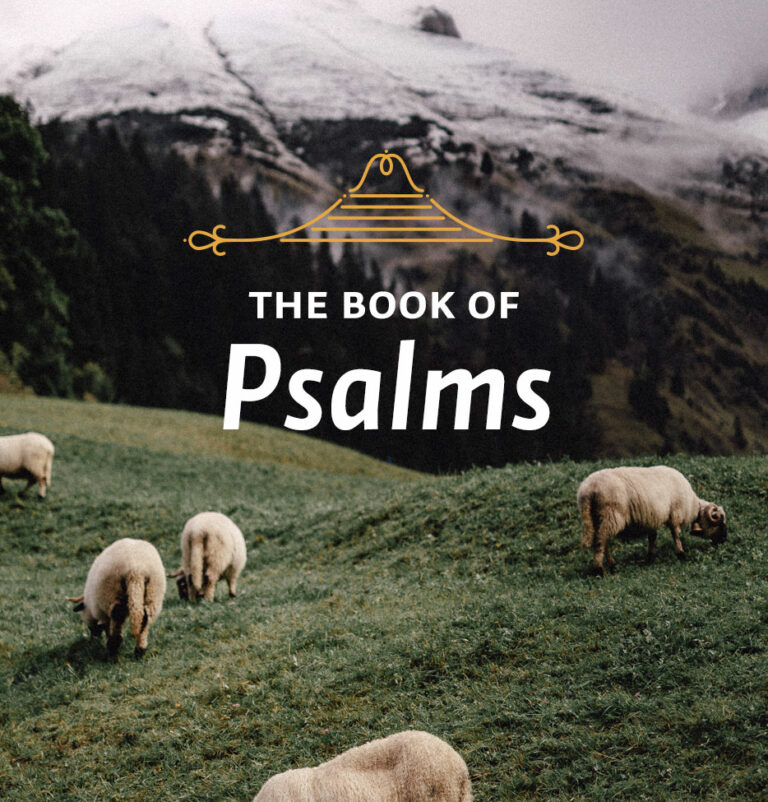
Tuesday: By the Rivers of Babylon
Theme: Sadness in a Strange Land
In this week’s lessons, we are reminded of the need to trust God in the midst of great hardship and difficulty, and to wait upon him for help.
Scripture: Psalm 137:1-9

Theme: Sadness in a Strange Land
In this week’s lessons, we are reminded of the need to trust God in the midst of great hardship and difficulty, and to wait upon him for help.
Scripture: Psalm 137:1-9

Theme: Faith in the Midst of Suffering
In this week’s lessons, we are reminded of the need to trust God in the midst of great hardship and difficulty, and to wait upon him for help.
Scripture: Psalm 137:1-9

Theme: Appealing to God for Justice
In this week’s lessons, we are reminded of the need to trust God in the midst of great hardship and difficulty, and to wait upon him for help.
Scripture: Psalm 137:1-9

Theme: Repent
In this week’s lessons, we are reminded of the need to trust God in the midst of great hardship and difficulty, and to wait upon him for help.
Scripture: Psalm 137:1-9
Christians may have problems with the vindictiveness and violence of this passage of Psalm 137, but it is important to notice other points as well. In yesterday’s study, for instance, we noted that the words are an appeal to God for justice. Today we look at two other things evident in these verses.

Theme: A Contrast
In this week’s lessons, we are again directed to the privilege of offering to the Lord our worship and our thanks for who he is, for what he has done, and for what he promises to do for his people.
Scripture: Psalm 138:1-8

Theme: A Puzzling Phrase
In this week’s lessons, we are again directed to the privilege of offering to the Lord our worship and our thanks for who he is, for what he has done, and for what he promises to do for his people.
Scripture: Psalm 138:1-8

Theme: God’s Word and God’s Name
In this week’s lessons, we are again directed to the privilege of offering to the Lord our worship and our thanks for who he is, for what he has done, and for what he promises to do for his people.
Scripture: Psalm 138:1-8

Theme: Anticipating a Future Day
In this week’s lessons, we are again directed to the privilege of offering to the Lord our worship and our thanks for who he is, for what he has done, and for what he promises to do for his people.
Scripture: Psalm 138:1-8

Theme: God’s Perfect Purpose
In this week’s lessons, we are again directed to the privilege of offering to the Lord our worship and our thanks for who he is, for what he has done, and for what he promises to do for his people.
Scripture: Psalm 138:1-8

Theme: Theology of the Best Kind
In this week’s lessons, we see the importance and blessing of God’s omniscience.
Scripture: Psalm 139:1-12
Somewhere in J. I. Packer’s writings there is a reference to the Puritan theology as theology of that “older, better, wiser and more practical sort.” That applies to the Puritans, but it applies even more to the theology of Psalm 139. For here is theology that is even older, even better, even wiser and even more practical. It is theology of the very best sort.

Theme: God’s Omniscience
In this week’s lessons, we see the importance and blessing of God’s omniscience.
Scripture: Psalm 139:1-12
The theme of the first six verses is the omniscience of God, the proper term for the fact that God sees and knows everything. But omniscience is not expressed here as mere doctrine. It is confessed in wonder and adoration, as the other doctrines (omnipresence and omnipotence) will also be. We should remember that confession is one way in which we worship God.1

Theme: The Perfection of God’s Knowledge
In this week’s lessons, we see the importance and blessing of God’s omniscience.
Scripture: Psalm 139:1-12

Theme: No Escape from God
In this week’s lessons, we see the importance and blessing of God’s omniscience.
Scripture: Psalm 139:1-12

Theme: When All Will Stand before God
In this week’s lessons, we see the importance and blessing of God’s omniscience.
Scripture: Psalm 139:1-12

Theme: Responding to God’s Attributes
In this week’s lessons, we learn about the benefits of God’s omniscience for his children.
Scripture: Psalm 139:13-24

Theme: God’s Omnipotence and the Human Person
In this week’s lessons, we learn about the benefits of God’s omniscience for his children.
Scripture: Psalm 139:13-24

Theme: God’s Knowledge and Our Obedience
In this week’s lessons, we learn about the benefits of God’s omniscience for his children.
Scripture: Psalm 139:13-24

Theme: Being Searched by God
In this week’s lessons, we learn about the benefits of God’s omniscience for his children.
Scripture: Psalm 139:13-24
As we concluded yesterday’s study, we noted that we can rebel against God’s knowledge and pursue evil, or we can ask God to search us with the goal of our being directed in his way. By repudiating the first and embracing the second option, the psalmist articulates a personal twofold response to this teaching.

Theme: Four Applications of God’s Omniscience
In this week’s lessons, we learn about the benefits of God’s omniscience for his children.
Scripture: Psalm 139:13-24

Theme: Worshiping While in a Wicked World
In this week’s lessons, we see the stark reality of evil, even in our own hearts, and that God protects and preserves those who come to him through faith in the Lord Jesus Christ.
Scripture: Psalm 140:1-13
I have been arguing for a number of studies that the final psalms in the Psalter, beginning with Psalm 135, are chiefly about worship. They tell us what worship is and how we are to worship God acceptably.

Theme: A Portrait of Evil People
In this week’s lessons, we see the stark reality of evil, even in our own hearts, and that God protects and preserves those who come to him through faith in the Lord Jesus Christ.
Scripture: Psalm 140:1-13

Theme: All in Need of a Savior
In this week’s lessons, we see the stark reality of evil, even in our own hearts, and that God protects and preserves those who come to him through faith in the Lord Jesus Christ.
Scripture: Psalm 140:1-13

Theme: The Ground for Our Appeal to God
In this week’s lessons, we see the stark reality of evil, even in our own hearts, and that God protects and preserves those who come to him through faith in the Lord Jesus Christ.
Scripture: Psalm 140:1-13

Theme: God’s Actions and Our Response
In this week’s lessons, we see the stark reality of evil, even in our own hearts, and that God protects and preserves those who come to him through faith in the Lord Jesus Christ.
Scripture: Psalm 140:1-13

Theme: An Evening Psalm
In this week’s lessons, we learn about David’s prayers, and how we, too, need to pray for God’s protection as we seek to live an upright life.
Scripture: Psalm 141:1-10

Theme: Hindrances to Prayer
In this week’s lessons, we learn about David’s prayers, and how we, too, need to pray for God’s protection as we seek to live an upright life.
Scripture: Psalm 141:1-10
Why do we find prayer boring? There are a number of reasons.

Theme: The Substance of David’s Prayer
In this week’s lessons, we learn about David’s prayers, and how we, too, need to pray for God’s protection as we seek to live an upright life.
Scripture: Psalm 141:1-10

Theme: Keeping Away from Evil
In this week’s lessons, we learn about David’s prayers, and how we, too, need to pray for God’s protection as we seek to live an upright life.
Scripture: Psalm 141:1-10
In today’s study we resume our look at verses 3 and 4 in which David asks God to “set a guard” over his mouth, his heart and his actions.

Theme: Walk on the Upright Path
In this week’s lessons, we learn about David’s prayers, and how we, too, need to pray for God’s protection as we seek to live an upright life.
Scripture: Psalm 141:1-10

Theme: Alone and in Trouble
In this week’s lessons, we are reminded of God’s care for us as we cry out to him in our troubles.
Scripture: Psalm 142:1-7

Theme: Fervent Prayers
In this week’s lessons, we are reminded of God’s care for us as we cry out to him in our troubles.
Scripture: Psalm 142:1-7
The first two verses set the tone for the psalm, because here David is pouring out his distress before God, seeking God’s help in his trouble. He is praying urgently.

Theme: Seeing God in our Struggles
In this week’s lessons, we are reminded of God’s care for us as we cry out to him in our troubles.
Scripture: Psalm 142:1-7

Theme: Who God Is
In this week’s lessons, we are reminded of God’s care for us as we cry out to him in our troubles.
Scripture: Psalm 142:1-7
What did David see when he was in the cave alone? He saw that God was four important things to him and for him. We have already covered the first thing in yesterday’s study, that of a refuge. Let’s look at the next three points.

Theme: Three “Summits of Faith”
In this week’s lessons, we are reminded of God’s care for us as we cry out to him in our troubles.
Scripture: Psalm 142:1-7

Theme: A Life of Repentance
In this week’s lessons, we see how our entire lives should be characterized by repentance.
Scripture: Psalm 143:1-12

Theme: On the Basis of God’s Righteousness
In this week’s lessons, we see how our entire lives should be characterized by repentance.
Scripture: Psalm 143:1-12

Theme: Remembering and Following
In this week’s lessons, we see how our entire lives should be characterized by repentance.
Scripture: Psalm 143:1-12
In the third stanza David puts himself under an important spiritual discipline: to remember God’s acts on his behalf and for other godly people in past days. He uses three verbs to describe what he does: “I remember,” “I meditate,” and I “consider.”

Theme: The Foundation of God’s Character
In this week’s lessons, we see how our entire lives should be characterized by repentance.
Scripture: Psalm 143:1-12

Theme: The Importance of Personal Pronouns
In this week’s lessons, we learn what it means to trust God for his help and blessing.
Scripture: Psalm 144:1-15
Martin Luther used to say that true religion is to be found in personal pronouns. He meant that it is only when we are able to speak of God as “our” God and call Jesus “my” Savior that Christianity becomes more than mere ideas and is truly real for us.

Theme: God’s Faithfulness
In this week’s lessons, from this last psalm of David we see that we are given a guide for how to praise God.
Scripture: Psalm 145:1-21

Theme: Our Weakness and God’s Power
In this week’s lessons, we learn what it means to trust God for his help and blessing.
Scripture: Psalm 144:1-15

Theme: Our Covenant God
In this week’s lessons, we learn what it means to trust God for his help and blessing.
Scripture: Psalm 144:1-15

Theme: Singing a New Song
In this week’s lessons, we learn what it means to trust God for his help and blessing.
Scripture: Psalm 144:1-15

Theme: A Confident Prayer for Deliverance and Blessing
In this week’s lessons, we learn what it means to trust God for his help and blessing.
Scripture: Psalm 144:1-15

Theme: The Last of David’s Psalms
In this week’s lessons, from this last psalm of David we see that we are given a guide for how to praise God.
Scripture: Psalm 145:1-21

Theme: Three Important Statements
In this week’s lessons, from this last psalm of David we see that we are given a guide for how to praise God.
Scripture: Psalm 145:1-21
The nearly parallel lines in verses 1 and 2 make three statements, as we see below.

Theme: God’s Mercy
In this week’s lessons, from this last psalm of David we see that we are given a guide for how to praise God.
Scripture: Psalm 145:1-21
It was probably his reference to God’s “goodness” in verse 7 that led the psalmist to deal with God’s grace, compassion, patience and rich love (v. 8) in stanza three (vv. 8-13a), the theme introduced by verse 8.

Theme: A Wonderful Universality
In this week’s lessons, from this last psalm of David we see that we are given a guide for how to praise God.
Scripture: Psalm 145:1-21

Theme: Reminding Ourselves of God’s Blessings
This week’s lessons show us that it is essential to remember God’s blessings, and how we are to praise God for all that he is and for all he has done for us.
Scripture: Psalm 103:1-22

Theme: How Should a Person Praise God?
This week’s lessons show us that it is essential to remember God’s blessings, and how we are to praise God for all that he is and for all he has done for us.
Scripture: Psalm 103:1-22

Theme: Why Should a Person Praise God?
This week’s lessons show us that it is essential to remember God’s blessings, and how we are to praise God for all that he is and for all he has done for us.
Scripture: Psalm 103:1-22
Why should a person praise God? It is because of “all his benefits.” David lists what he means by God’s benefits in verses 3-5.

Theme: What Is God Like?
This week’s lessons show us that it is essential to remember God’s blessings, and how we are to praise God for all that he is and for all he has done for us.
Scripture: Psalm 103:1-22
As we read yesterday, we should praise God because of “all his benefits.” David lists what he means by God’s benefits in verses 3-5. Yesterday we looked at God’s gifts of the forgiveness of sins and healing. Today we continue with two more of God’s benefits.

Theme: Who Should Praise God?
This week’s lessons show us that it is essential to remember God’s blessings, and how we are to praise God for all that he is and for all he has done for us.
Scripture: Psalm 103:1-22

Theme: God-Centered Worship
In this week’s lessons, we are shown an abundance of reasons for which to praise the LORD.
Scripture: Psalm 147:1-20

Theme: Good, Pleasant, and Fitting Praise
In this week’s lessons, we are shown an abundance of reasons for which to praise the LORD.
Scripture: Psalm 147:1-20

Theme: God’s Care for Everything
In this week’s lessons, we are shown an abundance of reasons for which to praise the LORD.
Scripture: Psalm 147:1-20
Reflections on how God brought the exiles back from distant Babylon and reestablished them in a rebuilt Jerusalem leads the psalmist to reflect on God’s power, seen in his numbering and naming of the stars. Truly, “[God’s] understanding has no limit,” he writes (v. 5).

Theme: God’s Blessing and Rule
In this week’s lessons, we are shown an abundance of reasons for which to praise the LORD.
Scripture: Psalm 147:1-20

Theme: God’s Self-Revelation in the Bible
In this week’s lessons, we are shown an abundance of reasons for which to praise the LORD.
Scripture: Psalm 147:1-20

Theme: A Comprehensive Praise Psalm
In this week’s lessons, we see the comprehensive scope of worship—that all creation, both in heaven and on earth, is to praise the LORD.
Scripture: Psalm 148:1-14

Theme: Praise in the Heavens
In this week’s lessons, we see the comprehensive scope of worship—that all creation, both in heaven and on earth, is to praise the LORD.
Scripture: Psalm 148:1-14
Looking upward first, the psalmist sees two entities that he urges to praise God: the angels and the heavenly bodies. These are above man in the cosmic order, just as they are in Psalm 8 in which David looks upward to “the moon and stars” and “the heavenly beings [elohim]” (Ps. 8:3-5).

Theme: Praise on the Earth
In this week’s lessons, we see the comprehensive scope of worship—that all creation, both in heaven and on earth, is to praise the LORD.
Scripture: Psalm 148:1-14

Theme: False Worship
In this week’s lessons, we see the comprehensive scope of worship—that all creation, both in heaven and on earth, is to praise the LORD.
Scripture: Psalm 148:1-14

Theme: True Worship
In this week’s lessons, we see the comprehensive scope of worship—that all creation, both in heaven and on earth, is to praise the LORD.
Scripture: Psalm 148:1-14

Theme: Singing a New Song
In this week’s lessons, we see the importance of song in worship.
Scripture: Psalm 149:1-9
We need to begin this study by thinking about singing, not performing before an audience, but the kind of singing that takes place because a person is happy and singing seems a natural way to express delight. This happens when a person sings alone, like singing in the shower. But it also happens when a person sings with other people, as Christians do in church.

Theme: Singing of God as Creator
In this week’s lessons, we see the importance of song in worship.
Scripture: Psalm 149:1-9

Theme: Singing of God as King and Savior
In this week’s lessons, we see the importance of song in worship.
Scripture: Psalm 149:1-9
The second truth about God that was a delight to the psalmist is that God is our King.

Theme: Victory in Spiritual Warfare
In this week’s lessons, we see the importance of song in worship.
Scripture: Psalm 149:1-9
In yesterday’s study, I concluded with the point that while Christians can serve as soldiers, they are not to try to advance the work of God by killing its enemies.

Theme: New Songs on Earth and a New Song in Heaven
In this week’s lessons, we see the importance of song in worship.
Scripture: Psalm 149:1-9
We love the old songs, of course, just as we love the old doctrines (Jer. 6:16). But each generation has fresh lessons of God’s grace, and new experiences of God’s grace call for new songs. Israel had experienced God’s goodness in bringing the people back to their homeland and (probably) giving them a military victory. So they composed this psalm.

Theme: Worship as an “Appetite for God”
In this week’s lessons, we learn how this last psalm teaches and exhorts everyone, everywhere to praise the LORD.
Scripture: Psalm 150:1-6

Theme: Where We Should Praise the LORD
In this week’s lessons, we learn how this last psalm teaches and exhorts everyone, everywhere to praise the LORD.
Scripture: Psalm 150:1-6
Where should this be done? Where should “everything that has breath” praise God? The first verse gives us a comprehensive answer. It is “in his sanctuary” and “in his mighty heavens.”

Theme: How to Praise the LORD
In this week’s lessons, we learn how this last psalm teaches and exhorts everyone, everywhere to praise the LORD.
Scripture: Psalm 150:1-6

Theme: God-Centered and Mind-Engaging
In this week’s lessons, we learn how this last psalm teaches and exhorts everyone, everywhere to praise the LORD.
Scripture: Psalm 150:1-6
In yesterday’s study we looked at those churches that forbid the use of instruments in worship. But there is another side to this controversy as well. We look at that side in today’s study.

Theme: Who Is to Praise the LORD
In this week’s lessons, we learn how this last psalm teaches and exhorts everyone, everywhere to praise the LORD.
Scripture: Psalm 150:1-6
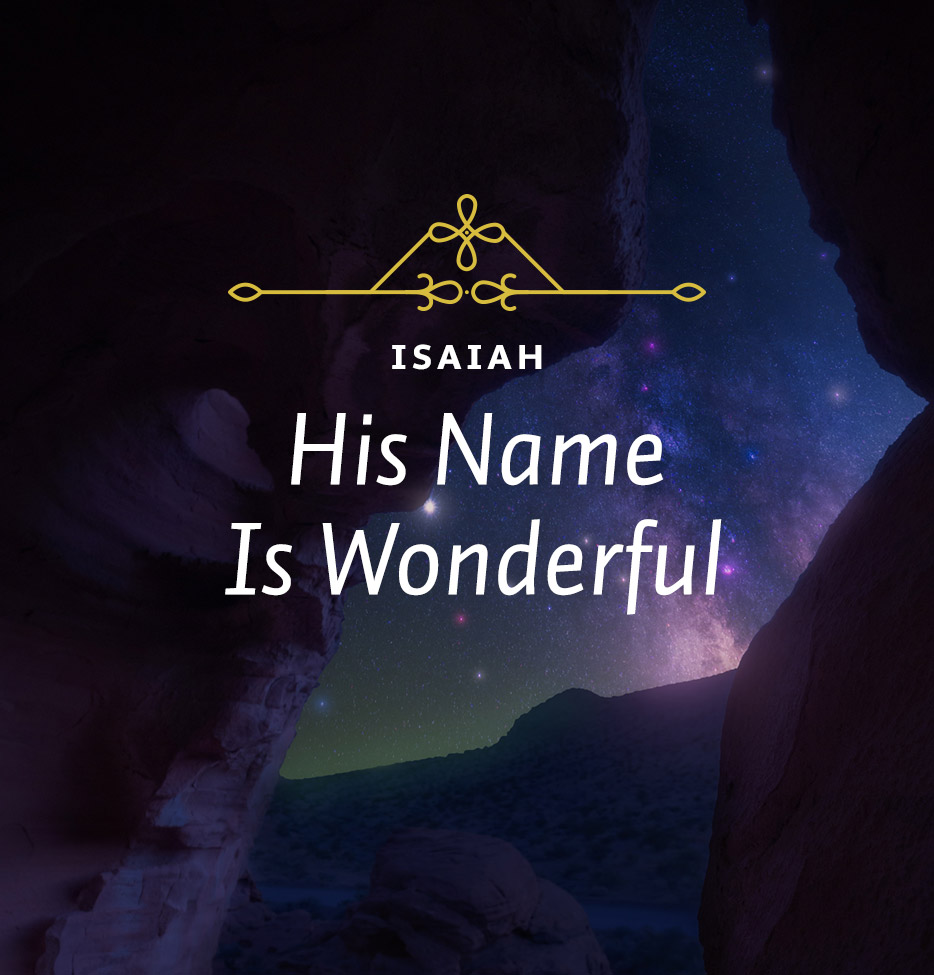
It is appropriate at Christmastime to think together about this wonderful person Jesus, and consider why He was given this name that, so far as we know, is given to absolutely no other man or woman. I want to mention a number of things.

We talk about our Lord’s conception and we say, yes, His name is Wonderful, for our Lord’s divine nature is wonderful. Jesus was a true man; we confess that and we confess it gladly because He became like us in His humanity. He identified with us in all of the sufferings that we know. The Bible says He became like us in every respect, except in the fact that we are sinners and He was sinless.

Jesus’ teaching was truly unparalleled. On one occasion, the chief priests and Pharisees sent the temple guards out to arrest Him, and they came back a while later not having done it. When the religious leaders heard this, they asked, “Why didn’t you bring him in?” The guards replied, “No one ever spoke the way this man does” (John 7:45-46). Can you imagine a policeman refusing to arrest someone whom he was sent to arrest because the man spoke wonderfully? Yet, that’s what happened in the case of Jesus Christ. So wonderful were His words, so wonderful was His teaching, that His enemies were unable to effect His arrest until He Himself brought about His own arrest in order to line things up for His own crucifixion.

Seventh, the Lord Jesus Christ is wonderful in His death for others. First of all, it was a voluntary death. He didn’t need to die. At His arrest, when one of the twelve disciples drew a sword and cut off the ear of the servant of the high priest, Jesus rebuked the disciple and said that if He wished, He could call forth legions of angels. God would send them to His aid to defend Him. We read in the Bible that death is the penalty for sin. Jesus was sinless, and therefore didn’t need to die. Yet He did die, nevertheless, for the sins of others. He did it voluntarily and He spoke about it on numerous occasions.

I commend this wonderful Jesus to you, and I ask, are you His follower? Do you know Him? Is he your Savior? If not, don’t let Christmas go by without making what is the greatest decision anyone can possibly make in this life, the decision to follow Him faithfully as your Savior and your Lord. And if you are a Christian, rejoice over the wonderful Savior you have. Moreover, don’t merely rejoice privately, although we all need to do that. But go out and tell the world that the wonderful Savior, indeed, has come!

There are many wonderful texts in the Old Testament that prophesy the coming of Jesus Christ. But one of the most remarkable of all is Isaiah 9:6. It’s part of Handel’s Messiah, so we have heard it sung and no doubt we’ve recited it. We have heard it read many times at Christmas: “For to us a child is born, to us a son is given, and the government will be on his shoulders. And he will be called Wonderful Counselor, Mighty God, Everlasting Father, Prince of Peace.”

When you begin to ask even the simplest of questions about your own identity, you’ll soon find yourself plunged into a realm that goes far beyond anything you and I could answer by ourselves. Where are we going to find a counselor who can help us with those questions? Isaiah says that there was to be a child born who will give us counsel. Moreover, this Messiah is God come in human form.

Jesus said the Holy Spirit would be our Counselor and be with us. And John writes that Jesus is also our Counselor as He reigns in heaven. I should point out here that this word parakletos, one who is called alongside another to help, is the Greek equivalent of the Latin word from which we get our word “advocate.” Jesus comes alongside as our advocate, as a lawyer does when he represents his client. Both the Son of God in heaven and the Holy Spirit present here in us on earth act as our divine Counselors, always acting wonderfully toward us.

Someone might conclude that all of this is interesting, but ask how it is that this term “Everlasting Father” is used of Christ. After all, Jesus is the Son, not the Father. What is Isaiah talking about when He speaks of the coming Messiah as the “Everlasting Father”? By using this name of the child who will be born, Isaiah is identifying this child with Almighty God. We need to remember that toward the end of Jesus’ ministry Philip asked Him to show the disciples the Father. And Jesus’ response was, “Don’t you know me, Philip, even after I have been among you such a long time? Anyone who has seen me has seen the Father” (John 14:8-9). Jesus was affirming the unity of His divine nature with the Father.

And then finally there is the title Prince of Peace. That title more than any other is associated with Christmas because it’s what the angels were talking about. They said “Glory to God in the highest, and on earth peace to men on whom his favor rests.” You and I need wisdom. We need power. We need this kind of all-embracing home. And we also need peace, because in ourselves we are not at peace. James describes the wicked—which is what we are apart from the work of Christ—as a troubled sea that has no rest. Somebody has said that the chief problem with the human race is that human beings don’t know how to sit in their room and be still. We’re always up to something. We’re always restless. We’re churning around inside. We just cannot sit quietly and contemplate God and be content. Jesus is the One who comes to bring peace because He Himself embodies peace, and give His peace to us.
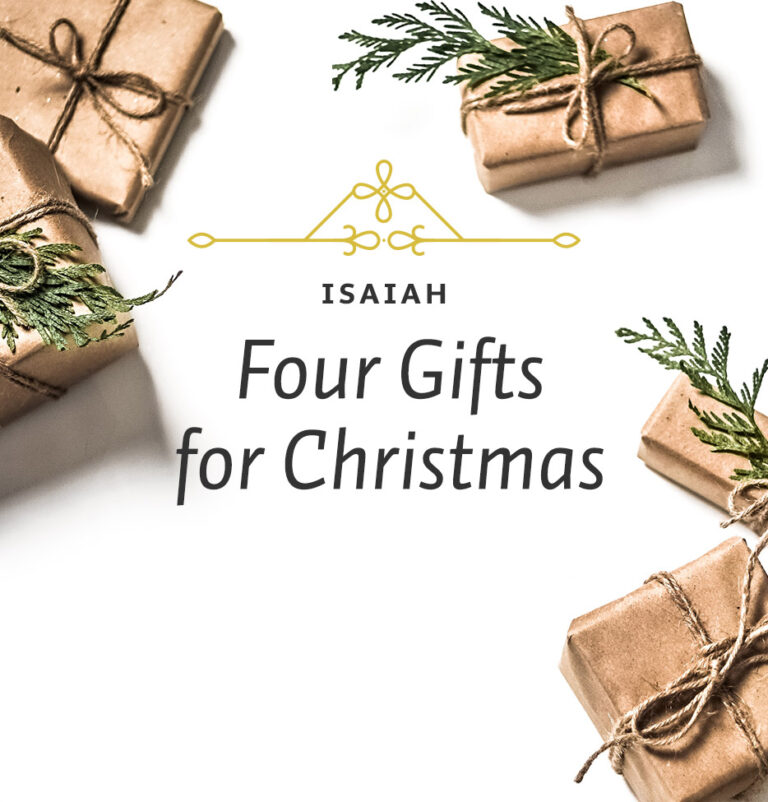
What happens when a baby is born? Well, if you’re close to the family, you often bring a gift. Here’s a case where the child Himself brings gifts because, by virtue of who He is and what He should do, He brought gifts to men. What’s very striking about these gifts is that they match our needs, which is what I hope to show as we look at them one at a time.

When Jesus came to be a wonderful counselor and then by the resurrection and ascension return to heaven, He did not leave us without wisdom. Rather, He continues to provide the wisdom we need. James talks about it. He says, “Do any of you lack wisdom?” Any of us who have any wisdom at all at that point say, “Indeed we do! We lack it a great deal.” And then he says “If any of you lack wisdom, let him ask of God, who upbraideth not but giveth to all men liberally (or generously), and it will be given him.” And he goes on in that same chapter to say, “Every good gift comes from God.” If you value wisdom, ask God for it, and He will give it to you. It comes through Jesus Christ, our Wonderful Counselor.

In a sinful and increasingly unrighteous world, we may feel that we lack power. It can seem as if the evil all around us is winning. But before Jesus’ ascension, He told his disciples, “But ye shall receive power, after that the Holy Ghost is come upon you: and ye shall be witnesses unto me both in Jerusalem, and in all Judaea, and in Samaria, and unto the uttermost parts of the earth” (Acts 1:8). And with that message and that assurance they literally went out and transformed the world.

One of the great privileges that comes from being made a member of God’s family is prayer, because now we can come to God not as aliens but as sons and daughters. Because of this, we’re encouraged to come to God in prayer, knowing that our Father knows all about us and loves us and cares for us and encourages us to come. Furthermore, He promises to answer our prayers that are pleasing to Him. The Holy Spirit helps us in our prayers by interceding for us before God, even when we do not know what we should pray for, or how.

Sermon: Four Gifts for Christmas
Scripture: Isaiah 9:6
In this week’s lessons, we look further at the four names of Christ seen in Isaiah’s prophecy concerning the child to be born.
Theme: The Gift of Peace
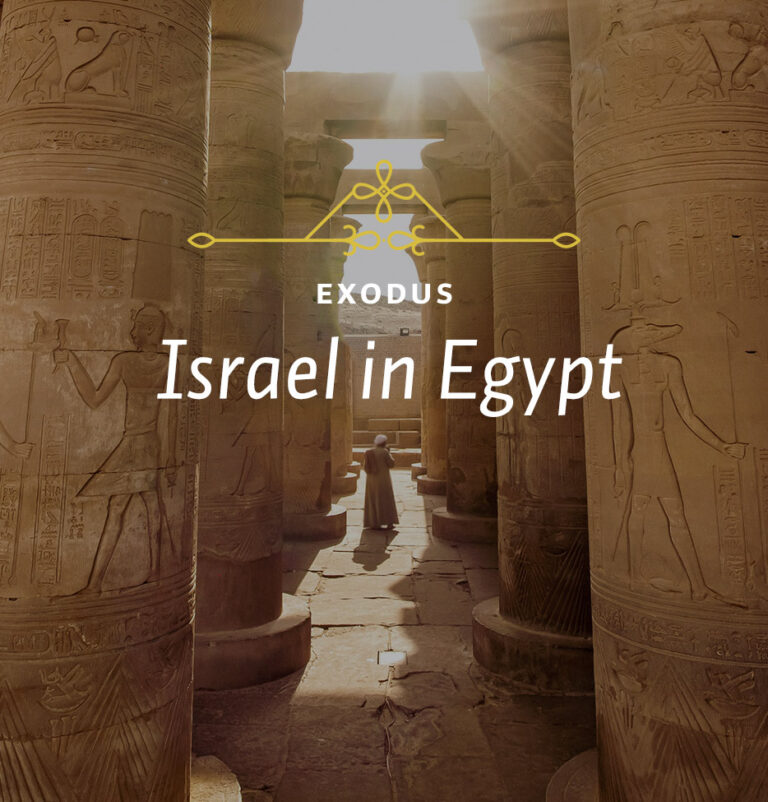
Apart from Jesus Christ, no person in history has made such a deep or lasting impression on the world as Moses. Moses was the great lawgiver and emancipator of Israel. He is described in the book of Revelation as the servant of God, and he had a remarkable history. He was born to Jewish parents in a land that was not their own, where they were slaves. He was educated in the court of the mightiest empire of the day, one of the mightiest empires that has ever existed in history. He was heir to all of the wealth, prestige, and legendary pleasures of Egypt. And yet, when he was 40 years old, he elected to identify himself with his own oppressed race. He was driven out and had to flee from Egypt.

Moses lived to be 120 years old. And roughly speaking he had 40 years in each place. When he was 40 years old he had to run away, and he spent 40 years in the desert as a shepherd. God met him at the burning bush and called him to be the deliverer when he was 80 years old. And then he led the people for 40 years. It has been said that Moses spent 40 years in Egypt learning something. He spent 40 years in the desert learning to be nothing. And then he spent the last 40 years of his life proving God to be everything. I think that’s a good way of putting what the Christian life is all about. Some of us don’t prove God to be everything, because we never learned that we ourselves are nothing. And when we come to that point, then we are ready to have God work through us. And that’s what He did with Moses.

The tie between Exodus and Genesis is closer than is apparent to most of us in our English translation. For one thing the Hebrew text of Exodus begins with the word “And.” We don’t write that way in English so the translators don’t begin it that way, but it actually says, “And these are the names.” Numbers and Leviticus begin this way. What he is saying, of course, is that the story that’s about to begin now in Exodus is not a new story, although it’s a new chapter in this continuing story of redemption. Rather it’s a continuation of what God began to do when He first called Abraham, the father of the Jewish people, out of Ur of the Chaldees.

Now I would like us to look at that call to Abraham, because it gives us an outline of what’s coming. Next time, we’re going to see a little bit more about the condition of the people in Egypt, and after that the birth of Moses. I want you to see that what we find here in these books—Exodus, Leviticus, Numbers, and Deuteronomy—is what was prophesied very clearly by God to Abraham, and recorded for us in Genesis 15. This chapter describes what was probably the most significant day in the whole life of the patriarch Abraham.

Do you want to get to know God better? God wants you to get to know Him better. Tell Him that you would like to get to know Him better, and you will find that He will reveal Himself to you, as he did to Moses.
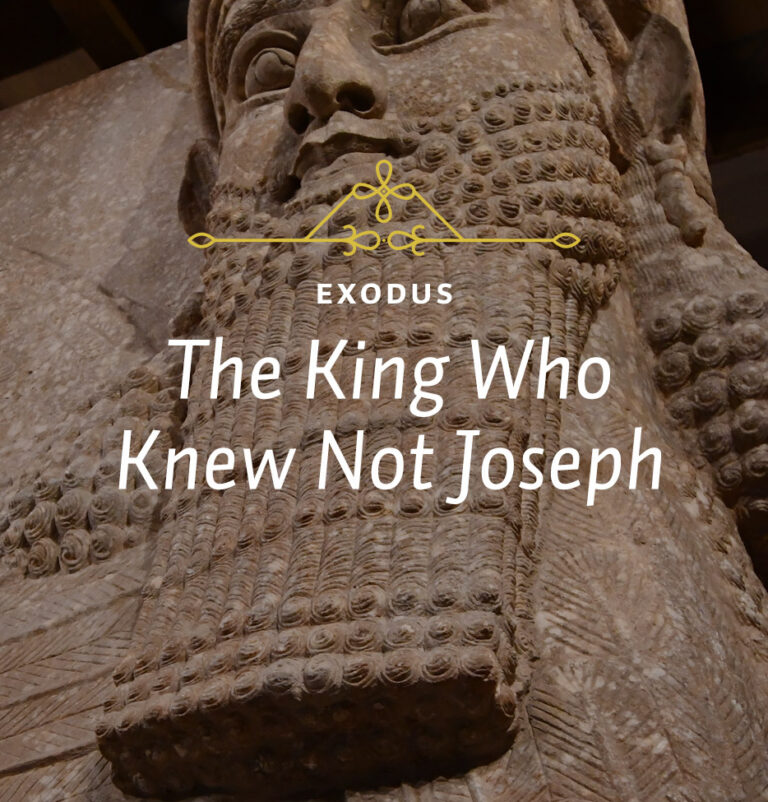
Sermon: The King Who Knew Not Joseph
Scripture: Exodus 1:8-22
In this week’s lessons, we learn about the historical setting for the exodus, and see that it is far better to be counted among the righteous lowly who serve the Lord than the pagan great who serve the world’s idols.
Theme: Egypt’s History

Sermon: The King Who Knew Not Joseph
Scripture: Exodus 1:8-22
In this week’s lessons, we learn about the historical setting for the exodus, and see that it is far better to be counted among the righteous lowly who serve the Lord than the pagan great who serve the world’s idols.
Theme: Egypt’s Cultural Condition

Sermon: The King Who Knew Not Joseph
Scripture: Exodus 1:8-22
In this week’s lessons, we learn about the historical setting for the exodus, and see that it is far better to be counted among the righteous lowly who serve the Lord than the pagan great who serve the world’s idols.
Theme: Dating the Exodus

Sermon: The King Who Knew Not Joseph
Scripture: Exodus 1:8-22
In this week’s lessons, we learn about the historical setting for the exodus, and see that it is far better to be counted among the righteous lowly who serve the Lord than the pagan great who serve the world’s idols.
Theme: Sophisticated Yet Cruel

Sermon: The King Who Knew Not Joseph
Scripture: Exodus 1:8-22
In this week’s lessons, we learn about the historical setting for the exodus, and see that it is far better to be counted among the righteous lowly who serve the Lord than the pagan great who serve the world’s idols.
Theme: Trusting the Lord and Doing What Is Right
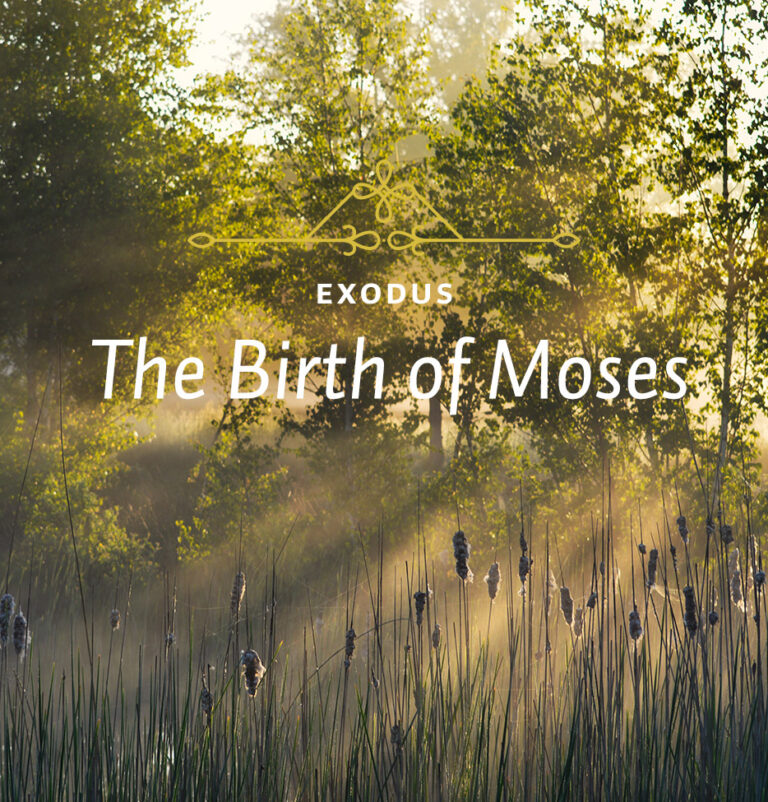
There is a verse in Isaiah 44 which comes to my mind when I think of this period in Jewish history prior to the birth of Moses. God is speaking and He says to the people through Isaiah, “I will pour water on the thirsty land and streams on the dry ground” (Isa. 44:3). It’s usually that way with God. It’s when things are grim, when the earth is spiritually barren and dry, that the Holy Spirit moves and blessing follows.

In yesterday’s devotional, we concluded by saying that God always had a remnant, those who are faithful to Him even in dry times. Now that’s exactly what we have here in the second chapter of Exodus. In this case, the remnant that we’re told about is one family, a husband and wife, whose names were Amram and Jochebed. Amram means “exalted people.” We’re not given his name in Exodus 2, but the name is supplied elsewhere in the Old Testament genealogies in Exodus 6, Numbers 3, 1 Chronicles 6, and so on. He was of the tribe of Levi, and lived to be 137 years old. Jochebed means “the honor of Jehovah.”

This princess came down to the water, where she saw the little ark. Her slave girls were there, and she sent them to fetch it. When they opened it up there was a child, and the child was crying. Seeing this touched the heart of this woman. And so the God of providence, who had ordered the steps of the princess to the Nile at the very time that Moses was there in the basket (having been placed there by his mother), caused the baby to cry and touch the heart of the woman. And He softened the heart of this high-born lady toward the Hebrew child. Proverbs 21:1 says, “The king’s heart is in the hand of the LORD, and he directs it like a watercourse wherever he pleases.” It’s not only the king’s heart, it’s the king’s daughter’s heart, too. And that’s what He did on this occasion.

God is a God of providence, not just the God of miracles. That means that He has been operating in all of the details and all of the circumstances of your life. Shouldn’t you recognize that if you believe in a providential God? And shouldn’t you thank Him for it? You say, “Well, I don’t like my circumstances.” Yes, but we have to learn to thank God in whatever state in which we are. That’s what the Apostle Paul learned to do. And furthermore you need to trust Him in those circumstances, even when things don’t seem to be going well.

Get into the habit of learning to think like God. If you get into the habit of looking for the remnant, you’re going to find it. They will not be the people the world is generally looking to for doing important things. It says in the Bible that the people God uses are the foolish, the weak, and the despised. And the reason He does that is because it’s through them that He can display His wisdom and reveal His righteousness. So look for people like that. And then when you’ve found them, get alongside them and work with them to see what God will do.
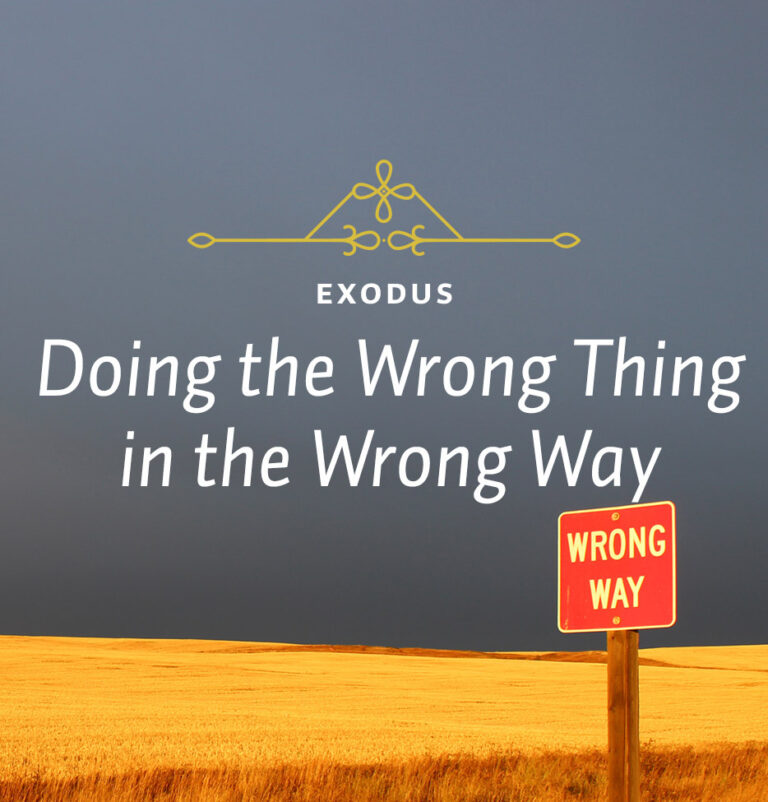
Moses’ educational background was important, and God gave that to prepare him for the work He had for Moses. Yet it was overshadowed by the education he received in his early years in his home from his slave mother. She taught him about God. We already saw that this was a godly family, and apparently for several generations.

When Moses was forty years old, there came this momentous turning point in his life. We all have turning points in our lives, decisions we make that affect what happens afterward. But it is hard to imagine any turning point in anyone’s life more monumental than what happened with Moses when he threw in his lot with his people and turned his back on the pleasures of Egypt.

We have a tendency, simply because we live in the world and are surrounded by the world’s ideas and ideals, to want to do God’s work in the world’s way, even as Christians. What is the world’s way? Well the world’s way is power, pressure, and money. And so we think that we need to do things that way, too. We need to collect a war chest in order to get our programs through, and we need to get our people elected and put them in positions of government so they can pass laws and force people to do what we think is right. Now there is a place for just laws and they flow from a citizenry who wants to do just things. But the Christian mode of operating is not by money or by power or by politics. Our way of operating is by the Word, teaching it to others, and also by prayer, asking God to bless it.

The last verses of Exodus 2 say, “The Israelites groaned in their slavery and cried out, and their cry for help because of their slavery went up to God. And God heard their groaning and he remembered his covenant with Abraham, with Isaac and with Jacob. So God looked on the Israelites and was concerned about them” (vv. 23-25). The Bible startles us from time to time by these understatements. God was concerned about them. I’ll say He was! He was about to shake heaven and earth to get them out of Egypt and bring them into their own land

Are you demoralized because of some past failure? You can find yourself thinking, “God can’t use me anymore. I have failed Him.” Well, that’s what the devil would like you to think. And in case you don’t think of it, the devil will put those thoughts into your mind anyway. But listen, it is not true! And Moses is a great example to the contrary. He certainly failed, but it didn’t mean that God couldn’t use him. God came again and he used him greatly. God knows you. He knows you’re only dust. He made you. He’s not surprised that there is failure in you. He knows what you are like. But He also knows what He is able to do through you by Jesus Christ, and that makes the difference.
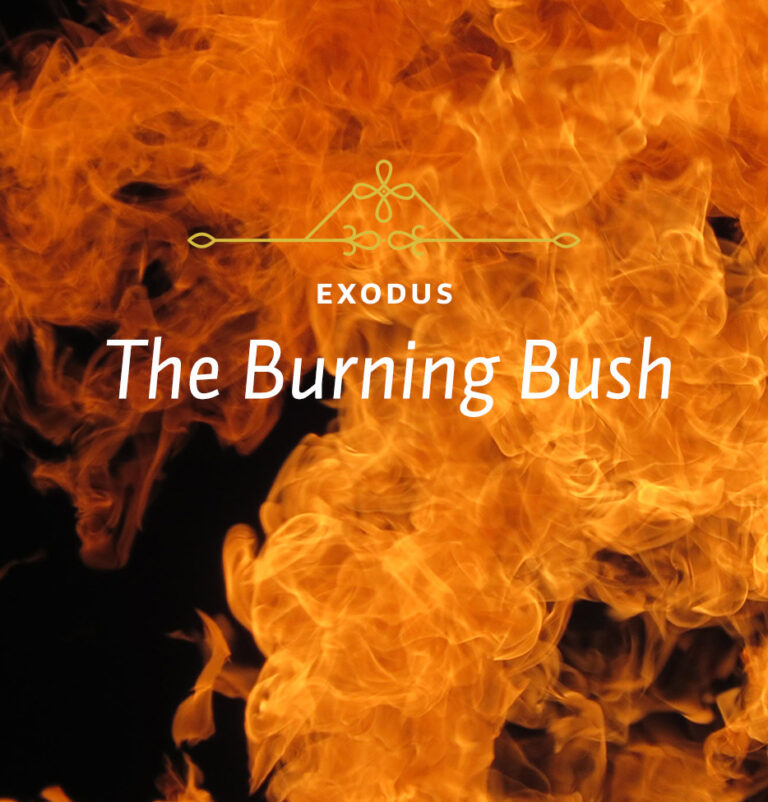
There’s a phrase that’s used in Old Testament and New Testament scholarship that you may have heard; it’s the phrase, “the silent years.” What that refers to is the period between the last of the Old Testament prophets, Malachi, and the appearance of God to Zechariah in the New Testament to announce the birth of John the Baptist—four centuries in which there was no new revelation from God. God was silent. Now there’s a period like that in the early history of Israel, and about the same length of time.

God is also holy. And when Moses approached this bush he had to take off his sandals. Sandals of course would be dirty, picking up dust of the ground. Thus, they became a symbol for defilement or impurity. But the significance of putting off the sandals is to approach God in holiness, and that’s what Moses had to do.

When God revealed Himself to Moses by saying “I am,” the very fact that he said “I” indicated how personal He was. That’s a very important thing to bear in mind because when we are talking about God, we are not talking about some cosmic force. You can’t worship a force any more than you can worship gravity. God reveals Himself here to be a person who is able to interact on the personal level with Moses, a human being.

The name also points to God’s self-sufficiency. Self-existence means that God has no origin; self-sufficiency means that God has no needs. “I am that I am.” That’s what God is saying to Moses. Now it is true that God graciously uses us to carry out His plans. He was doing that with Moses, after all. He was calling Moses because He was going to send Moses to Egypt to be His agent in bringing the people out to their own land. But He didn’t need to use Moses, and He doesn’t need to use us either.

The second sign God gave him was a leprous hand. He was to put his hand inside his cloak, and when he pulled it out it had turned white with leprosy. When he put it back in again, it was cured. I suppose the power of that came from the fact that the Egyptians were very fastidious about personal cleanliness. They didn’t want defilement, and leprosy was the ultimate defilement. So here you have a revelation of a God who is able to inflict with illness and also to cure. Later on in the plaques, we are going to find out that the gods of Egypt who were supposed to do that were unable to do it. They were powerless before God.
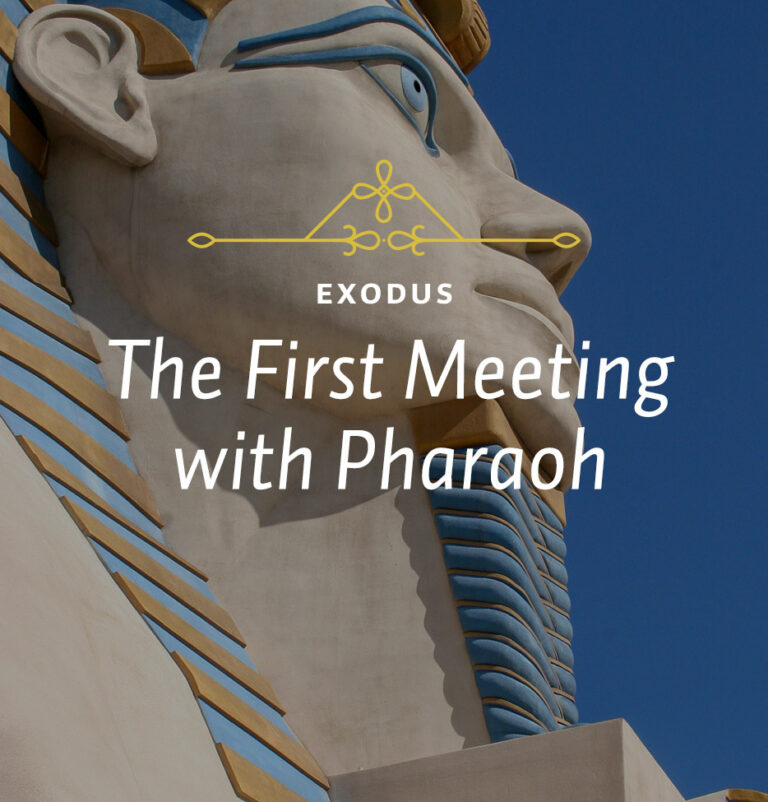
Chapters 5 and 6 tell of the first meeting of Moses and Aaron with Pharaoh. When we become Christians, most of us have a pretty good idea in our minds of how the Christian life ought to go. We live in a technological age and we think of things working well, efficiently, on time, and in a predictable fashion. And we think that’s exactly the way the Christian life ought to go. It’s a little bit like driving a car: when you get into a car, turn the switch, step on the gas, you ought to move forward. Well, it doesn’t always work that way in the Christian life. We think we are doing the right things. But there seem to be setbacks and discouragements. And when that happens, and it happens quite often, we become discouraged. Many of us then wonder what’s gone wrong.

The idea of the separation of church and state is a perfectly valid doctrine, rightly understood. What that means is that the state is not to control the churches. In other words there is to be freedom of religion and churches can conduct their business as they please. And on the other hand, bishops or other officials in the church are not to dictate to the government. But it doesn’t mean that the state is not responsible to God, and never has to answer to the divine authority or live up to moral standards. It is the position of the church in a democracy where we have opportunity to speak out to remind the government that ultimately it is responsible to God, whether it acknowledges that or not.

Now in the context of Exodus, God demonstrated His power, wrath, and justice in judging Pharaoh. And He demonstrated His mercy in the way He saved Israel, the one as important as the other.

Here is Moses: defeated, rejected by his own people, alone, and isolated. I imagine they weren’t even talking to him. He did the only reasonable thing, and the only thing that was left. He prayed. He threw himself before God: “O, Lord, why have you brought trouble upon this people? Is this why you sent me? Ever since I went to Pharaoh to speak in your name, he has brought trouble upon this people, and you have not rescued your people at all” (5:22-23). It was a desperate prayer, growing out of a great deal of personal pain. But it was honest and it was accurate, wasn’t it? He had come and Pharaoh had not responded, and trouble had come upon the people. And it was quite reasonable to ask God why. God responded reasonably and accurately. He told Moses what He was about to do. In Exodus 6 God ministers to Moses by telling him seven things.

The third thing God said to Moses here in the sixth chapter is that he had a covenant with Abraham. Now that’s the covenant that we’ve already looked at. God expressed it in the fifteenth chapter of Genesis and elaborated it in the seventeenth chapter when circumcision, a sign of the covenant, was given. By it, God promised to bless Abraham, to multiply his descendants, and eventually to bring him into the promised land.
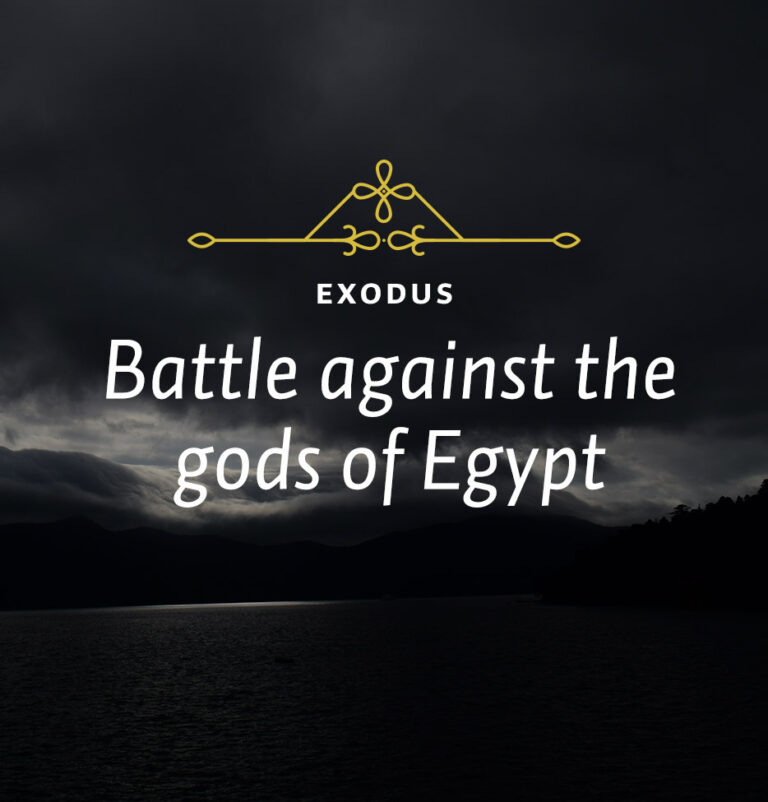
This week, we are going to look at the battle by which the Jews were freed from their slavery in Egypt. But I want to begin by saying that there is an enormous gulf between the way a secular historian would look at this and the way the Bible does. Secular historians might look at in a variety of ways, of course. Some would be inclined to see history as the acts of great men, and would say, “Well, this is a case of a marvelous leader, a man of great charismatic ability and faith and integrity and vision. And it was through the force of his personality that the people were brought out.” Somebody who is more inclined to think in terms of mass movements of people through the consolidation of the will of a vast number would say, “Well this is a people movement. Here were a vast number who, in this ancient culture, began to get a taste of what freedom was all about. They wouldn’t rest until they really obtained it.” That’s very different from what the Bible says.

Now God said to Moses and his brother that they were to go back and demand again that Pharaoh let the people go. This time they gave Pharaoh a sign. We’re told in Exodus 7 that they did the same sign that God had given to Moses when he was on Horeb on the other side of the Arabian Desert. When they appeared before Pharaoh, Moses had a staff in his hand, a shepherd’s crook, and he was to throw that on the ground. But when he did this and it became a snake, Pharaoh wasn’t very impressed. He probably had seen tricks like that done by his magicians. So he called over his magicians and they did the same thing, but with one very important difference: the snake that had come from the staff of Moses ate up the other snakes. You think that would give anybody pause! But it didn’t give Pharaoh much pause, and he still refused to let the people go. Exodus 7:13 says something that’s going to be repeated again and again in this struggle. It says, “Pharaoh’s heart became hard and he would not listen to them, just as the LORD had said.” Now at this point the plagues begin.

The second plague was an abnormal multiplication of frogs. God told Pharaoh to let His people go, and that if he did not, the Lord would bring a plague of frogs upon the country, in the Nile, in Pharaoh’s palace, in every house, even in their ovens and kneading troughs (Ex. 8:1-4). Aaron stretched out his rod over the Nile, and immediately all the frogs began to multiply and spread across the land.

Now the plagues got worse, with the sixth one being against the bodies of the people. Aaron took soot from a furnace and threw it up into the air. The dust dispersed and created boils on the bodies of the Egyptians. That must have seemed very ironic because one of the things they did in their ancient religion was to take the ashes of an offering and throw it into the air. The people thought they were blessed by these ashes thrown into the air and actually falling upon them. But what they regarded as a blessing is now a curse, and it causes boils to break out upon the people.

No more warnings would be given. The ninth plague came suddenly and without any announcement whatsoever. Darkness descended upon the land, and it lasted for three days. That was the most significant judgment of all in terms of Egyptian religion, because the greatest of all the gods was the sun god Ra, and Pharaoh was considered the incarnation of Ra.
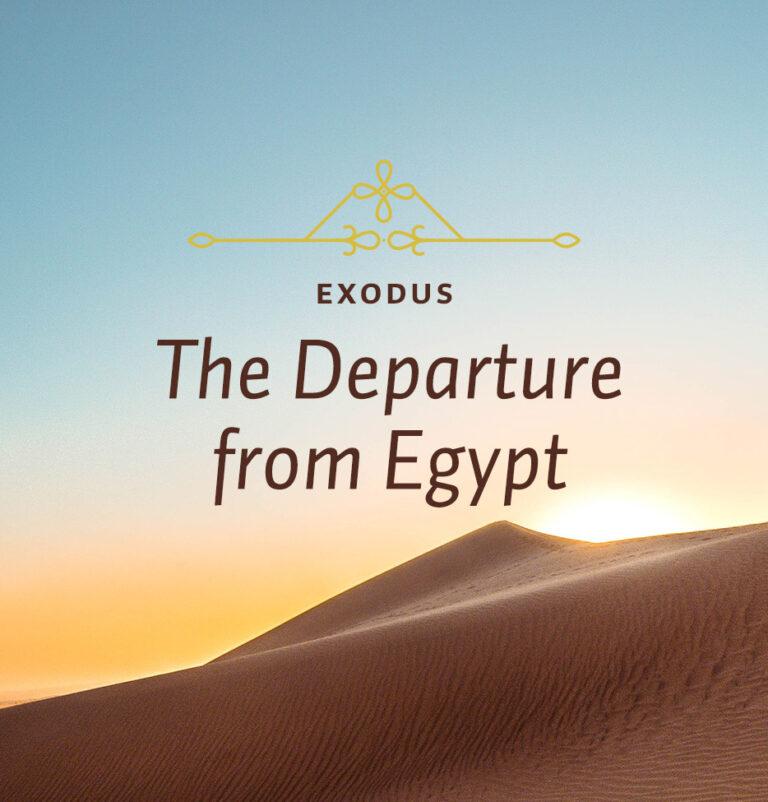
There are some days that stand out above all other days. That is true personally as well as historically. Of all the days that stand out in the minds of the Jewish people, this great day of the Passover and their exodus from Egypt must be above and beyond them all.

Now we come to the tenth plague itself. We’re told about the death of the firstborn at the end of chapter 12, in only two verses (vv. 29-30). They tell us that there was loud wailing in Egypt, and that there was not a house without someone dead. That is a very sober thing.

Yesterday, we said that the exodus teaches us important spiritual lessons. The first was that Israel was also guilty before God. Now there are reasons why the people might have been tempted to think differently. For example, even in the account of the plagues, from the fourth to the ninth plague, we are told that God made a distinction between His people who lived in the land of Goshen and the Egyptians in the rest of the land. This is why when the plagues came upon the Egyptians, it didn’t touch the Israelites. The Hebrews might have concluded that they were not harmed because they were special of themselves and that God would not do anything to judge them.

In our own day, the requirement of faith seems absurd to those who are unbelievers. You talk about salvation through faith in the work of Jesus Christ, something that a man did two thousand years ago, and people think you’re foolish. But this is what God says. He tells us that salvation is in Him and by Him alone. If we believe in Him we are spared, and the judgment passes over us; and if we don’t, we perish.

After all that had happened—the trauma of the night of the Passover, the march early the next morning, the deliverance by the passing through the Red Sea—what did the people do? They burst into song, led by Moses and his sister Miriam (Ex. 15:1-18).
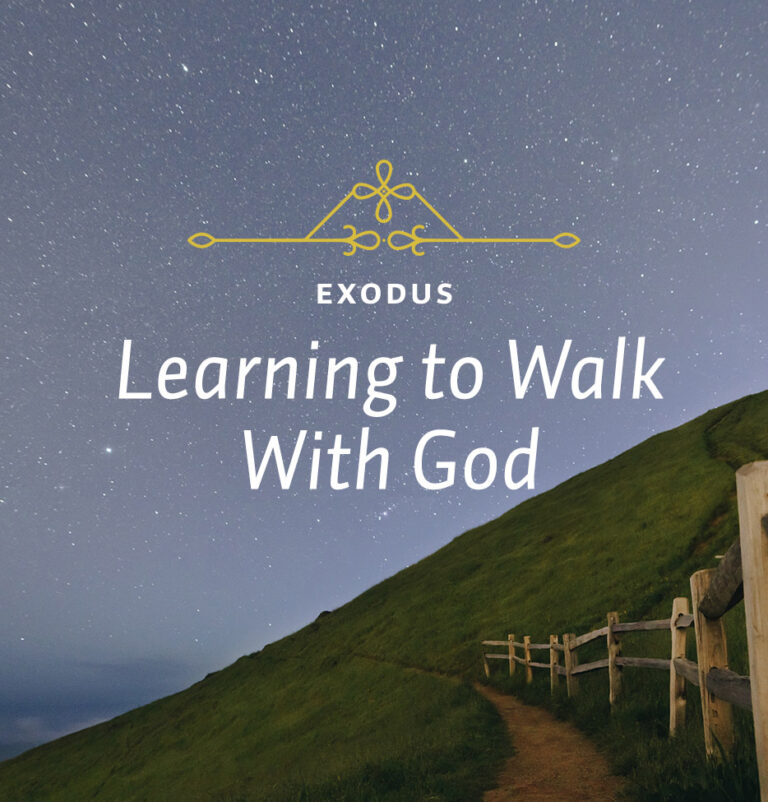
As Christians read these stories in Exodus, they see parallels to the Christian life. We think of Canaan, the land to which they’re headed, as being a picture of heaven, and the passage through the wilderness representing the pilgrimage of this life. The parallels are not always exact, but certainly they are in this respect: the people were not mature; they had to learn to trust the Lord and see His provision for them. And seeing how God provided for them during those years of wandering is very instructive for us as we go through life as Christians.

After the water at Marah was made sweet for the Israelites to drink, God said, “If you listen carefully to the voice of the LORD your God and do what is right in his eyes, if you pay attention to his commands and keep all his decrees, I will not bring on you any of the diseases I brought on the Egyptians, for I am the LORD who heals you” (15:26). Just as He healed the water, you see, He’s going to heal them.

God had provided food for the Israelites. We are told that they were to gather the manna each morning, just enough for each individual. They couldn’t keep it until the next day because it would spoil. On the sixth day they were to gather a double portion because it wouldn’t be provided on the Sabbath, when they were to rest. There is one other interesting thing about this and it does give us an idea on how we’re to interpret the manna. They were to take an omer of it, put it in a jar, and then put it before the ark of the covenant. Now at this point that is an anachronistic reference because they didn’t yet have the ark or the tabernacle. But later, when these had been constructed, they were to take some and lay it up in the holy place of the tabernacle as a remembrance of what the Lord had done (see Deut. 8:2-3). At the end of this passage from Deuteronomy 8 we see that “man does not live on bread alone but on every word that comes from the mouth of the LORD.”

A fourth parallel is that the manna gathered daily had to be eaten. It was not enough to see it on the ground, appreciate that it arrived that morning, gather it up, and then do nothing else with it. The purpose of the manna was to feed the people, which means they needed to eat it. In the same way, you and I have to do that with the Word of God. Moreover we have to do it bit by bit.

Following this battle, Moses erected an altar. The name he gave to it introduces another name for God: Jehovah Nissi, which means “the LORD is my banner.” The Lord is the banner around which we rally, and who gives the victory.
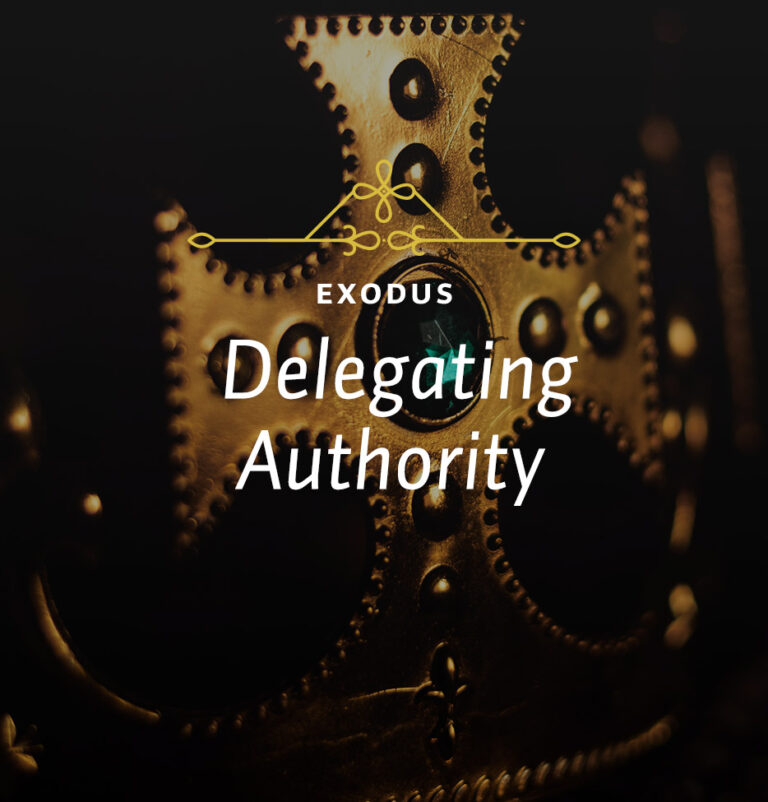
Leadership involves loneliness. The leader walks alone. The task of a leader is to set the vision, plan and motivate. By the very nature of the task, the leader is doing that more or less by himself. Sometimes it’s done with a team, of course, but not with the support or understanding of the masses of the people. Once you set a vision, it has to be communicated, and initially it’s not always shared. The plan, too, is so often misunderstood. And motivations are resisted. Yet the leader has to carry on.

These two old men have a great deal to share. Moses begins to rehearse to him all of the things that God had done on behalf of the people. Moses told of traveling to Egypt, meeting with the elders, and encountering Pharaoh, who rejected God’s demands. Moses told of the plagues and their significance. And then there was the night of the Passover, as the angel of death came through the land and killed all the firstborn of Egypt. After that, Moses recounted how Israel left in a hurry, and God saw them across the Red Sea and protected them in the desert, including delivering them from the Amalekites in that first great battle. In response, Jethro begins to praise God (vv. 10-11).

As I said, the heart of this chapter concerns the need for help in judging. The day after Jethro’s arrival, Moses went out to judge the people. They began to come to him early in the morning, and Moses made these judgments from morning until late at night. That’s not at all surprising, given that there are two million people. You can easily imagine that they got in one another’s way from time to time. Somebody’s sheep wandered over into the other man’s pen, and the first man wanted it back and the other one thought that it was his sheep all along. And there were probably things far worse than that. Moses was absolutely worn out from this task.

Moses was an extraordinary man. He had magnificent gifts and unbelievable training, the best possible training you could have in that day. But you see, even Moses couldn’t do everything. This is why you get the division of leadership. If he couldn’t do it, we can’t do it either. And we should be looking for people who can.

The second principle is very much like the first. Not only do you need a division of authority, but you also need a plurality of leadership. You find this in the New Testament. When Christ appointed apostles, He appointed twelve. And then when the early church appointed deacons, there were seven of them. When Paul traveled around the Roman world and established churches, he always left elders in charge, never just one. In my denomination we can’t have a self-governing church until we have at least two elders. There is wisdom in having more than one elder.
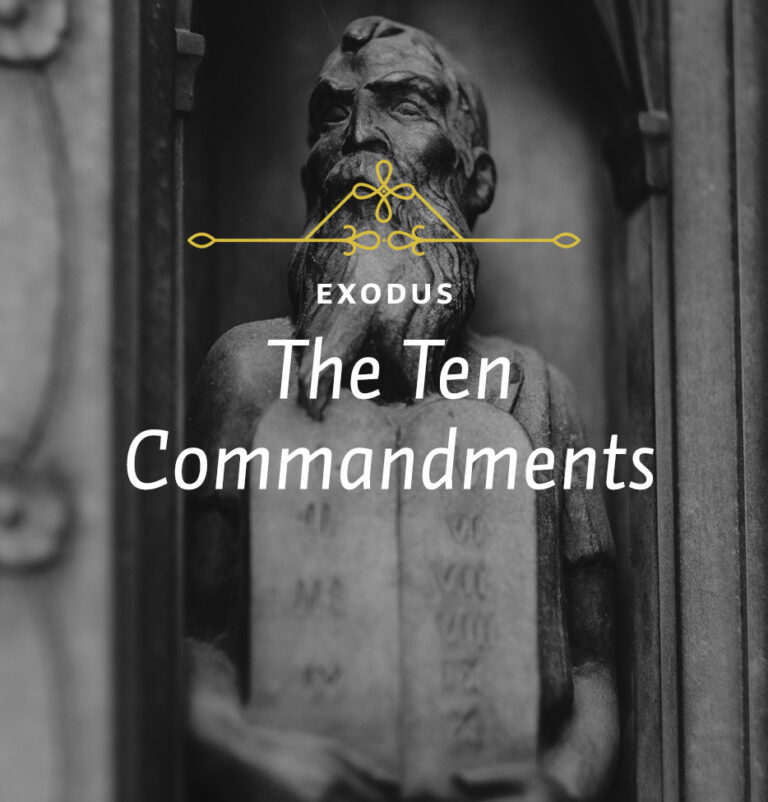
We have come to a very important division in the book of Exodus, Roughly divided, chapters 1-18 deal with the exodus itself, from which the book gets its name; and then the second half, chapters 19-40, deals with the giving of the law. We think of Moses as the great emancipator, but he was also the lawgiver by the grace of God. And this matter of giving the law was very necessary if the Jewish people were to be formed into a true nation. Deliverance from slavery is one thing, but freedom without law leads to license—and license is only another form of slavery. So, what we find in the second half of the book is the work of God through Moses in providing the people with the law code.

There is nothing that our society needs as much as the Ten Commandments. In a commencement address at Duke University in 1987, Ted Koppel, the well-known news broadcaster, reminded the class of the Ten Commandments, and the fact that our culture needed them very much. He went down the list of them and he related them to all the moral problems of our time. Nobody liked that, but he was absolutely right.

All but two of the Ten Commandments are expressed in negative form, but the negative form implies the positive. Thus, when God says, “You shall have no other gods before me,” that’s the negative. The positive form implied in that is, “You shall worship me only and exclusively.” Jesus handled the commandments the same way. When Pharisees came to Jesus on one occasion, they asked, “Teacher, which is the greatest commandment in the Law?” Jesus, quoting from Deuteronomy, replied that the first commandment is this: “Love the Lord your God with all your heart and with all your soul and with all your mind” (Matt. 22:36-37). That’s the positive side of what the first commandment requires.

The fourth commandment tells us, “Remember the Sabbath day by keeping it holy.” Now up to this point, there is general agreement as to what the first three commandments require, even though we don’t keep them. When we come to this fourth commandment, there is no longer full agreement on what that’s talking about. The seventh day here is prescribed as a day of Sabbath rest. Yet, as we well know, the majority of Christians don’t observe it. We worship on Sunday instead, which is the first day of the week. In addition, we worship differently from what is prescribed in other places in the law.

The law reveals to us the holy character of God. As sinners, we cannot keep it as we are commanded. But Jesus Christ has kept the law perfectly for all those who come to Him in faith. Knowing this, we go on in His strength, through His Spirit, striving to please Him in all things. Ask yourself these questions: What has this study revealed to me about my sin and the changes in my life I need to make? Has it actually pointed me to Jesus Christ? Am I trusting Him as my Savior? Am I looking to Him for forgiveness and cleansing? Do I desire to be holy, even as God is holy? If not, why not? If so, what are the steps I should be taking?
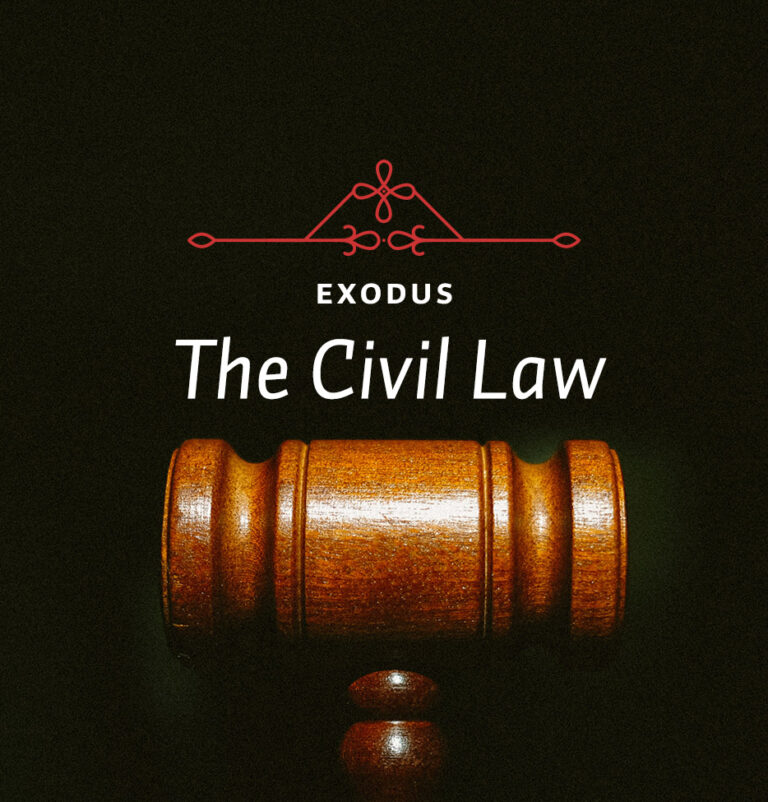
After the giving of the Ten Commandments, we have the civil law, seen in chapters 21-23. This has to do with the new nation of Israel, and how it was to be administered, and how crimes were to be punished. We call this the civil law, but the book of Exodus actually calls this and the section on the Ten Commandments the Book of the Covenant. These chapters then conclude with the confirmation of the covenant.

Yesterday we looked at one view explaining the usefulness of the law in our own time. Today we look at the other two. The second view is that of dispensationalism, which makes a very strong contrast between the dispensation of law (the Old Testament) and the dispensation of grace (the New Testament).

Regarding these three views—the traditional approach, dispensationalism, and reconstructionism—as different as they are, they do agree on two things: the ceremonial law has been fulfilled in Jesus Christ, and that the moral law applies today in some way, though each has a different understanding for how this should be done. I maintain that the traditional approach is the best because it believes that the covenant does continue from the Old Testament into the New, while also recognizing that there are changes that have come through the work of Christ.

The second category are laws relating to personal injury: homicide, physical injuries such as being kidnapped, maimed, or even hurt by words, and injuries caused by animals. The first part of this section makes a distinction between murder, which is intentional, and manslaughter, which is an accidental killing without malice or premeditation (see 21:12-14). Murderers were to be put to death. That’s not because the Bible treats life lightly. Quite the opposite! We are the ones who treat life lightly. The Bible treats life with respect because people are made in the image of God, such that if somebody murders another, he must be put to death. It’s as serious as that.

Chapter 23:1-9 concern justice in the courts. Bribes were common in the ancient Near East. They pervert justice, and should be rejected. All of the other statements in this chapter have to do with Sabbath laws and festivals (see 23:10-19). We might think that when we look at these laws having to do with Sabbath observances and festivals that they really belong with the ceremonial law. That is true, they do. And they are repeated later, especially as we study Leviticus. But they are included here, and the reason I include here them is that they concern justice for the land, justice for animals, and even justice in regard to God.
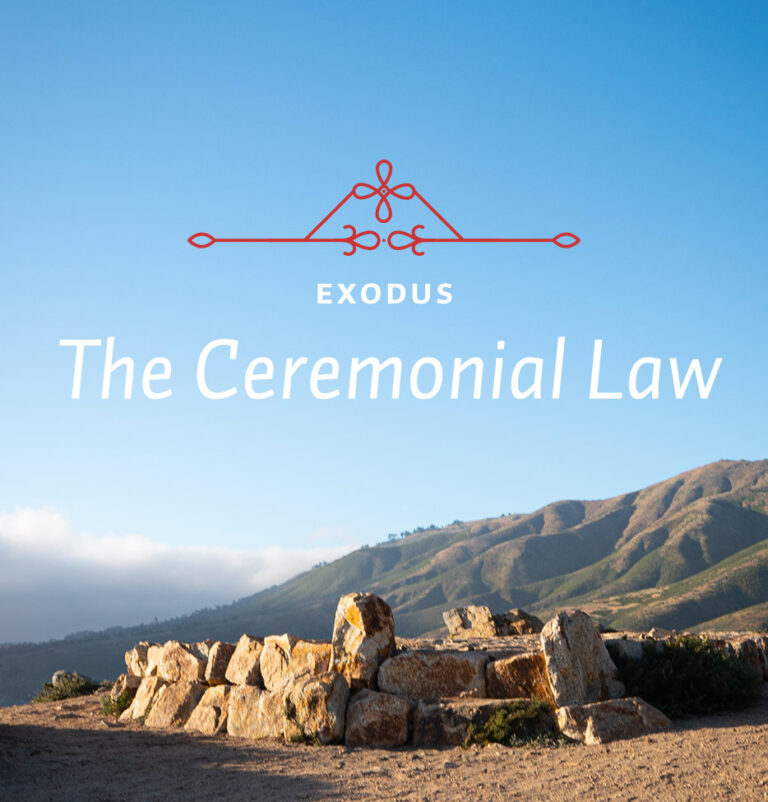
The book of Exodus falls into two main parts. The first part has to do with the exodus itself, which gives the book its name. The second part deals with those early months of Israel’s desert wandering, during which God gave them three types of law: the moral law, embodied in the Ten Commandments; the civil law, having to do with their civil government; and then finally the ceremonial law.

The ark contained a number of things. The first and most important thing it contained was the Ten Commandments, the stone tablets. It also had a gold jar that contained some of the manna that the people got during their years in the wilderness. It also contained Aaron’s rod that had budded. Because it contained the law, the ark was given different names. It was called the ark of the testimony because that referred to the law; the ark of the covenant, since the covenant was established on the basis of the law; or simply the ark of God, or the ark of the Lord Jehovah.

When you went in you came to the tabernacle itself. It too was a rectangle, and had two rooms: the Most Holy Place and the Holy Place. The Most Holy Place was a perfect cube, measuring fifteen feet by fifteen feet by fifteen feet. The outer room was twice as long: thirty feet long, fifteen feet wide, and fifteen feet high. Thus, the whole tabernacle was forty-five feet long. Of particular interest was the curtain that divided the Holy Place from the Most Holy Place. It was made of blue, purple, and scarlet yarn, and fine linen. It had figures of cherubim worked into it. Its purpose was to shield the visible presence of God from human eyes. It could only be passed through once a year, and even then only by the high priest, and that was on the Day of Atonement.

In Exodus 28, the description of the furniture breaks off, and we have a description of the garments that are to be worn by the priests of Israel, followed by an account of their consecration. Now that seems misplaced, doesn’t it? We already talked about one thing that seemed out of order, when we looked at the ark. However, we saw why the ark was treated first. Here, we haven’t heard about the altar of incense yet, or the basin that was used for purification. Why doesn’t the story go on and finish up with the furniture and then talk about the priests and their garments?

Exodus 30 now goes back to talking about the furniture, picking up with the altar of incense (vv. 1-10). This may seem out of place. After all, the description of the furniture was interrupted by material about the priests, and now Moses is going back to talk about the furniture. Not only that, but the altar of incense was in the outermost room, the Holy Place. It seems that it should have been discussed back when Moses was talking about the table of showbread and the menorah. But like before, the explanation is a theological one. Incense symbolizes the prayers of the saints (see Rev. 5:8). The incense arises to heaven, as our prayers do, and it smells sweet. Our prayers are sweet to God. He wants to hear our prayers, even when we stumble around and don’t quite know what to pray about.
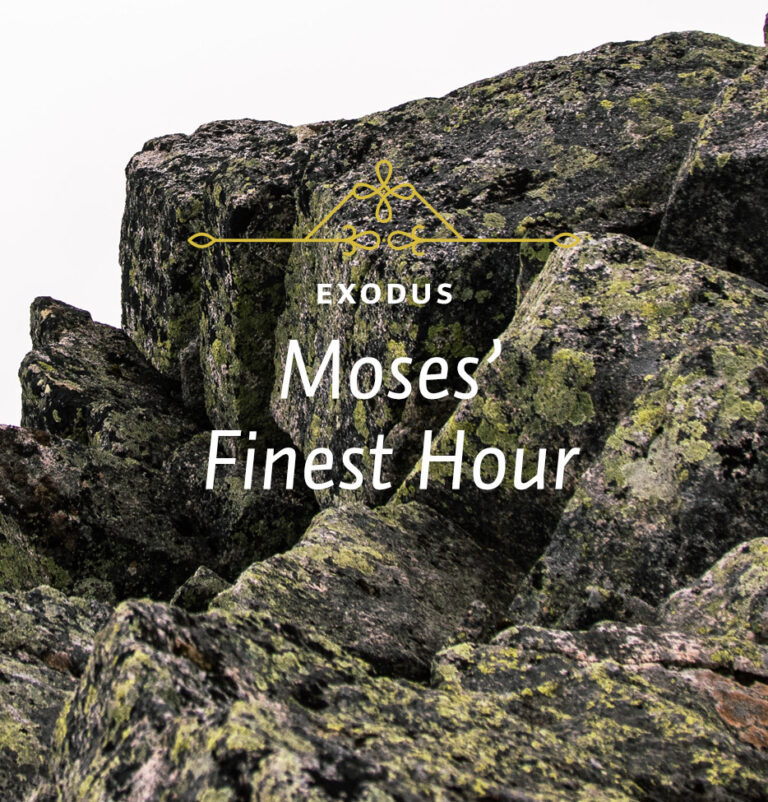
There are always moments in the life of an individual or even in the life of a nation which provide an opportunity for greatness. And if they are seized, they lead on to great things. And if a person or a nation fails to seize them, they lead to defeat and discouragement. Exodus 32 was a moment like this, and it’s what I call the finest hour in the life of this most outstanding man, Moses.

The second lesson from the story tells us of the problem with images. God had just given Moses the Ten Commandments, and one of the things we learn from them is this: “You shall not make for yourself an idol in the image of anything in heaven above, or on the earth beneath, or in the waters under the earth. You shall not bow down yourself to them or serve them.” It goes on to explain how the punishments of God will come upon those who do, even to the third and fourth generations.

Moses began to plead for the people, and he had two very impressive arguments. First of all he said to God, “What will the Egyptians say if you destroy your people? What they’ll say is this, ‘It was with evil intent that you brought them out to kill them in the mountains and to wipe them off the face of the earth.’ Therefore turn from your fierce anger, and relent and don’t bring this disaster on the people.” If God were to destroy the people, the Egyptians will win after all. No one wanted the Egyptians to win.

Third, he called those who had remained faithful to God, and he commissioned them to execute a limited judgment on the people. He asked who was on the Lord’s side, and the tribe of Levi came forward. Then he told the tribe of Levi to take their swords and kill. It doesn’t say it in so many words, but he must have meant for them to kill the leaders. There were probably several million people, and they didn’t kill that many. What is stressed is that they were to execute judgment even on those who were members of their family, their friends, and their neighbors. And the Levites did it. They showed that they were faithful to God.

Earlier, we were talking about the ironies of the story. On the preceding day, before Moses had come down the mountain, God had made that great offer to him. He had said to Moses that He was going to destroy the people, save Moses, and make a new nation of him. Moses went down the mountain, and he met with the people. He realized that he still loved them in spite of their sin. Then, Moses goes back up the mountain, and makes a powerful intercession for the people. He asks God to save the people and destroy him. As far as you and I know, there’s never been a greater offer made by any human being in all of the course of history.

In last week’s devotional, we saw that the people had sinned in the making of the golden calf. Moses had intervened on their behalf, and God had postponed the judgment. God had even promised to go with the people and not abandon them. One of Moses’ pleas was that God had made an eternal covenant with His people, the covenant made to Abraham, Isaac, and Jacob, and, therefore, that Moses wanted God to keep the covenant. God answered that he would keep His covenant and bring the people into His land. God said that He would send His presence before them. Perhaps He was referring to the cloud or an angel or something of that nature, because He said, “I myself will not go with them, because this is a stiff-necked people. And if I go with them and they sin again, my anger might break out against them and I would destroy them” (Ex. 33:3).

The third way in which we use that word “know” is by experience. You can say, “I really know Philadelphia because I have lived there all my life.” You can talk about a person that way. You can say, “I really know so-and-so because we worked together for thirty years and I know how she functions.” That’s knowledge by experience, which is a far greater and far more important kind of knowledge than mere awareness. We talk about knowing God—that is certainly what we want to achieve—not merely to know there is a God or merely to be able to talk about God, however accurate we may be, but actually to know God by experience, that is, to experience God for ourselves.

Before Moses came to his third request, he had achieved what he really wanted to achieve. As the leader of the people, he was very concerned that God go with him, and God said He would. But Moses isn’t quite satisfied. He is a remarkable man, and all the remarkable characteristics of this man come forward now. He recognized that he needed to know God, and what he had prayed for earlier, although God had promised to bless and teach him His ways, wasn’t quite enough. What Moses really wanted to see was the glory of God.

In this revelation, when God explains more fully to Moses what His name really means, He communicates what we call His communicable attributes, that is, the attributes of God the God can communicate or share with us because He has made us in His image. These are things like compassion, grace, slowness to anger, love, and faithfulness (Ex. 34:6), as well as goodness and mercy (Ex. 33:19).

In 2 Corinthians 3 Paul refers to Moses’ glowing face with a threefold illustration. First, he used it to illustrate the veiled and fading glory of the old covenant in contrast with the unveiled and abiding glory of the new covenant (vv. 7-13. Old things are passing away, and all things are becoming new. The glory of the fullness of the covenant in Jesus Christ overcomes the limited revelation in the old.
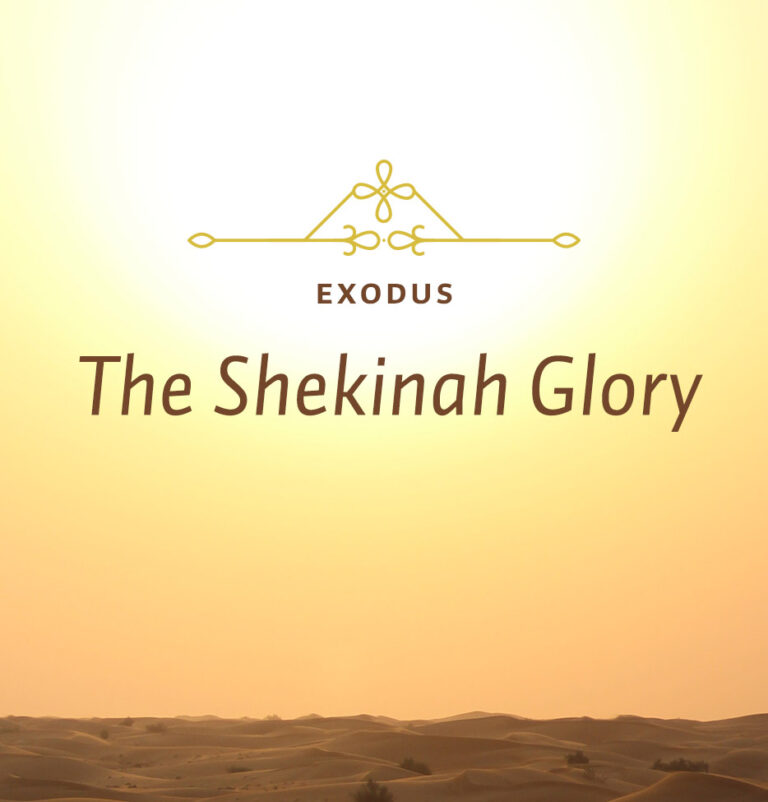
There are not many studies of the great cloud that protected the Hebrew people during the years of their desert wanderings. I think that is surprising, and for two reasons. It was a striking phenomenon. There has never been anything like it in history before or since. And not only was it striking, it’s mentioned many times in the Bible. There are fifty-eight references to it in the Bible, scattered across ten different books. It appears more often than place names like Bethlehem and Nazareth, or the names of Herod, Joseph, Mary, Cain, Abel and Satan.

Now we have to ask something about this cloud and try to figure out what it was like. They called it a cloud but the only reason they did so was because they really didn’t have any word in their vocabulary to describe it.

God’s revealing Himself in the cloud culminates in the coming of Jesus Christ. You may recall that at the very beginning of John’s Gospel, John uses this very language, harkening back to Exodus, to talk about the incarnation. Speaking of Jesus, John writes, “The Word became flesh and lived for a while among us. We have seen his glory, the glory of the one and only Son, who came from the Father, full of grace and truth” (1:14). Revelation 21 gives us the fulfillment of this idea of God’s dwelling among us. In verse 3 the apostle John wrote, “And I heard a loud voice from the throne saying, ‘Now the dwelling of God is with men, and he will live with them. They will be his people, and God himself will be with them and will be their God.’” Through the appearing of the cloud in Exodus, God was teaching them about His presence in a preliminary, rudimentary, visible, and dramatic way for the people of Israel.

The cloud was also God’s means for guidance. That was clear from some of the passages we read. When the cloud rose up from over the tabernacle and began to move off, the people were supposed to move off, too. When the cloud stopped the people were to stop. As Nehemiah says, “By day the pillar of cloud did not cease to guide them on their path, nor the pillar of fire by night, to shine on the way they were to take” (v. 19). Another passage that gives more detail is Numbers 9:15-23.

The Holy Spirit is given to us to enable us to follow as God leads and as we follow, to know that we are protected from all enemies. Nothing will ever happen to us that does not first pass through the will of God, and that whatever happens according to the will of God is ultimately for our good. “And we know that in all things God works for the good of those who love him” (Rom. 8:28). To follow the Lord in obedience to His commands, knowing that He always watches over and protects us, is our opportunity and our joy.
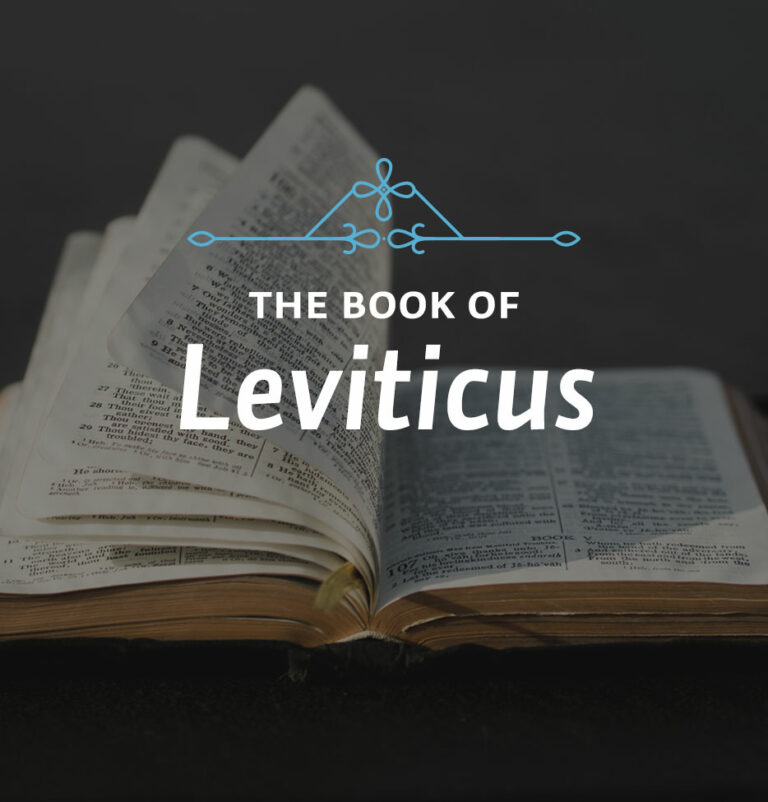
Leviticus is the third of these five books of Moses, and therefore stands in the very middle of the Pentateuch. Leviticus has to do primarily with the sacrifices and offerings, and so placing it in the middle of the five books of Moses may be a way of saying that sacrifices stand at the very heart of the Old Testament religion. They also point to the very heart of Christianity, because all of the sacrifices are fulfilled and brought to completion by Jesus Christ. And His death on the cross stands at the very heart of Christianity.

Of the sacrifices, the burnt offering is mentioned first because it was the most important. Leviticus doesn’t tell us what it was for because the answer is obvious. All the sacrifices on the altar are for sin. The text focuses on how the animals are to be handled. Notice two matters about this. First, the worshiper was to lay his hand upon the head of the burnt offering that was going to be accepted on his behalf (see Lev. 4:1). That’s a very critical idea and it pertains to all of the sacrifices. When the worshiper put his hand upon the sacrifice, this was a way in which he symbolically transferred his sin or guilt to the sacrifice. It was a kind of confession of sin, such that in a symbolic way his sin was passed to the animal. And then when the animal was taken and killed, it was killed in the place of the worshiper.

The last offering was the guilt offering, and it was made for damage that was done to another person or to another person’s property. We mustn’t think, of course, that if you damage somebody’s property either deliberately or by negligence, that all you had to do was go to the temple and present an offering. That would be an easy way to get off the hook. No, Leviticus describes very carefully what you have to do. You have to repay it, and then you have to add twenty percent—a fifth of the value—and then you had to give it to the person whom you had defrauded on the very day you went to present your offering.

The first section is that of clean and unclean foods (Lev. 11). This distinction between clean and unclean animals goes all the way back to the flood, because the animals that came on board were identified as either clean or unclean. However, we weren’t told back then how they were distinguished. Now we are told. In addition to making this distinction between animals for health reasons, we can also see how this first section demonstrated the second explanation above, namely, as a way to separate God’s people from the world.

n the matter of these purification laws, Jesus explains what these ritual requirements were meant to do. The principle is that it’s not what comes into you or touches you that makes you unclean, but what comes out. The problem is not external, but, rather, the problem is the uncleanness of your heart. Jesus said: “Don’t you see that whatever enters the mouth goes into the stomach and then out of the body? But the things that come out of the mouth come from the heart, and these make a man ‘unclean.’ For out of the heart come evil thoughts, murder, adultery, sexual immorality, theft, false testimony, slander. These are what make a man ‘unclean’” (Matt. 15:17-20a).
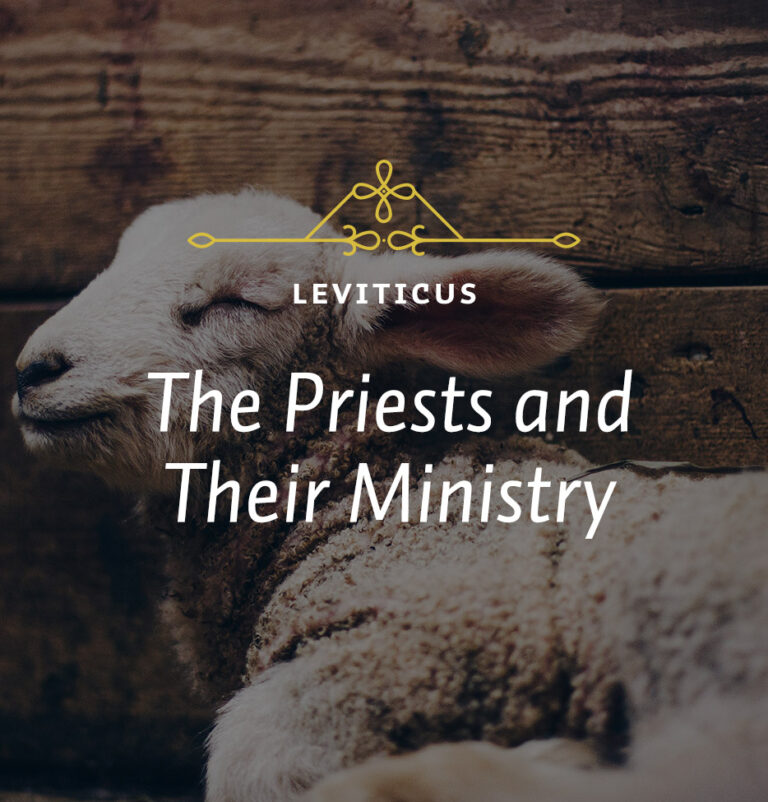
In last week’s devotional we saw that if you want to understand Leviticus, you have to understand holiness, as seen in the theme, “Be holy because I, the LORD your God, am holy” (19:2), which you find again and again throughout the book. But now we should ask what holiness is, since many of us have a mistaken idea of it. Somehow we think of holiness in exclusively ethical terms. Because we think of ethics as a scale from 0 (if you’re very bad) to 100 (if you’re very good), we think of holiness as kind of moving up the scale.

Jesus Christ is the perfect prophet, the perfect priest, and the perfect king. How does that apply to us? It applies to us in this sense: we’re told in the New Testament that although we do not serve as Jesus Christ did, and continues to do, nevertheless, because we belong to Christ we have roles that are somewhat analogous to His.
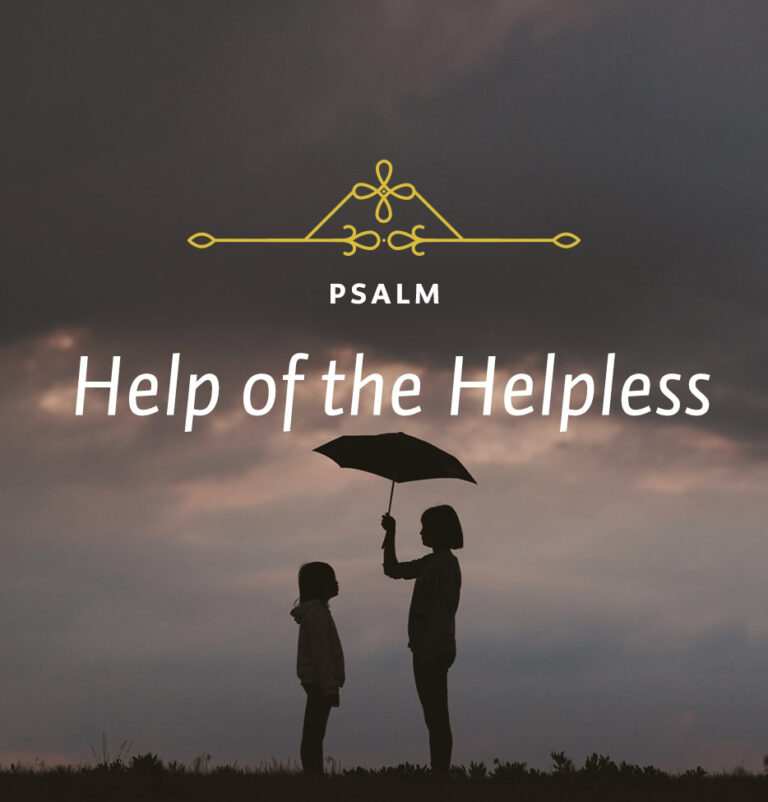
As we noted in yesterday’s study, verses 10 and 11 are hard to understand, and the result has been somewhat different translations in the versions. Roy Clements spells out four possible translations before settling finally on the NIV rendering. We looked at the first two possible translations yesterday, and continue with the second two in today’s study.
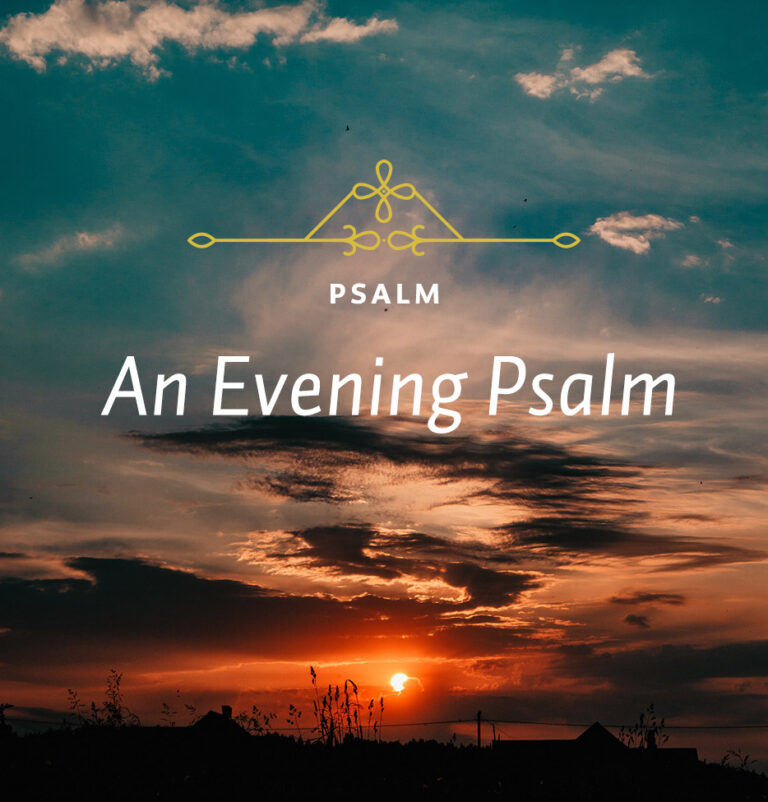
ls there such a thing as a totally righteous sufferer? Is anyone ever really innocent? The answer is: of course not, unless we are thinking of the Lord Jesus Christ, which is the way some of the interpreters of Psalm 4 have taken it. But that is not the point here. None of us is ever utterly innocent, but there are nevertheless times of relative innocence in which evil people really do heap injustices on us. There are times when we are falsely accused. At other times we are slandered. It may be because the other person wants to advance himself by getting us out of the way. At other times the attack may be occasioned by pure envy.

It is tempting to seek a historical setting for Psalm 4, just as for Psalm 3, but there is little justification for it. The title says merely: “For the director of music. With stringed instruments. A psalm of David.”

Who do you turn to when you hear of an unjust accusation that someone has been making against you? Suppose you are at work and the secretary down the hall stops by your desk and says, “Do you know what so-and-so said about you yesterday?” Then she pours out the story, perhaps even embellishing it a little. Or maybe a business associate circulates a memo in which you are pictured in an unjust light. What do you do? Who do you tell? Most of us would go to our friends and complain, looking for sympathy. We might even start a slander campaign of our own. It might go: “Well, the only reason she said that is because she…” This is not what David did. Instead of turning to friends for sympathy or even attacking his enemies, David turned to God. “Answer me when I call to you, O my righteous God. Give me relief from my distress; be merciful to me and hear my prayer” (v. 1). David knew that his only help was in God, which strikingly is where the psalm also ends. The last words of the psalm say: “You alone, O Lord, make me dwell in safety” (v. 8).

The most interesting part of this psalm is the second section (vv. 2-5) in which David relates to those who are harming him. They are wrong. He is right. He is asking God to help him. Nevertheless, although slandered and injured by them, David speaks of his enemies kindly and tries to win them from their errors. And there is this: in trying to help them, he unintentionally but inevitably helps himself.

Were David’s enemies likely to follow his advice, tremble before God, offer sacrifices for their sin and begin to trust the Almighty? It was not very likely! It is not even likely that David spoke these words to them. They are part of the psalm, words that David spoke to God and would have liked to have spoken to his enemies but probably did not have the chance to utter. But here is the important thing: although his enemies did not come to trust God, David did. He had trusted God in the past. He had laid his grief over the false accusations of his enemies before him. Now God provided the peace he was seeking. There were three things God provided.

The sacrifices that are offered in Leviticus 9 as part of worship are first of all for Aaron and his sons—that is, for the priests—and second, for the people. Now in the previous chapter the sacrifices were made at the ordination of the priests, which were a bull, a ram, and then another ram. But for the people here in Leviticus 9, the sacrifices were a male goat (the sin offering), a calf and a lamb (the burnt offerings), and an ox and a ram (the peace/fellowship offerings). For both the priests and the people, the sequence of the offerings was the same: first the sin offering, then second, the burnt offering, followed by the fellowship offering. This tells us how we must approach God.

The end of chapter 9 is probably the highest peak to be found in the entire book of Leviticus. The priests have been consecrated and ordained. They have offered the sacrifices during the first formal worship service of the people. God has come down upon the tabernacle to bless it in the visible presence of the shekinah glory. Yet, when you come to chapter 10 there is an enormous change. Suddenly we are in a different world, because instead of blessing, what you find is death.

At the beginning of this study I said that all Christians today are priests. Therefore what we learn from these chapters is to be applied for us. Peter makes a great deal of that, using Old Testament language to talk about Christians. He writes, “But you are a chosen people, a royal priesthood, a holy nation, a people belonging to God, that you may declare the praises of him who called you out of darkness into his wonderful light” (1 Pet. 2:9).
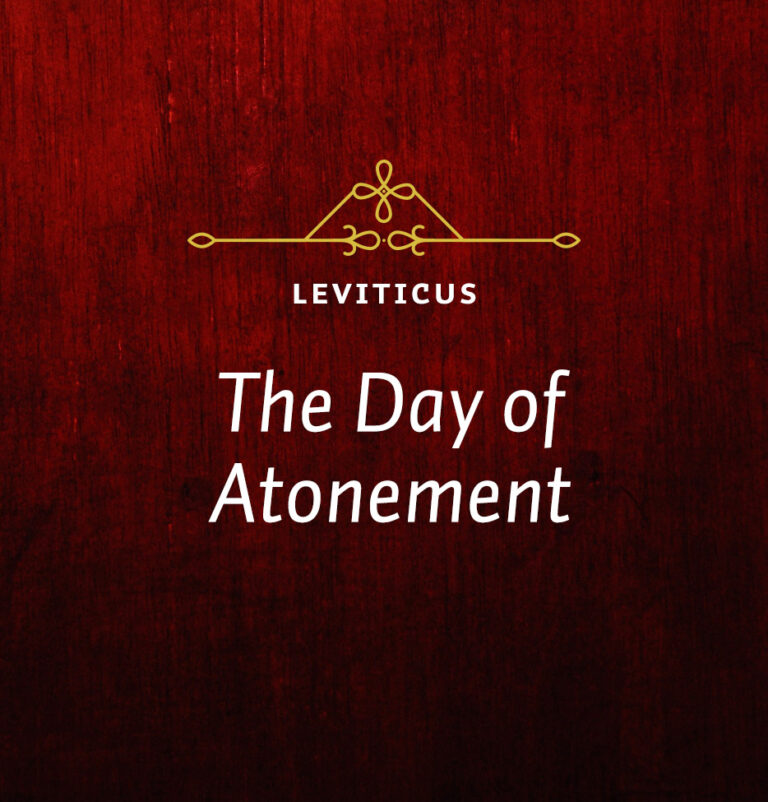
It’s impossible to overestimate the importance of Leviticus 16 in the religion of the Old Testament. Its teaching about the Day of Atonement is absolutely central to the book of Leviticus. Leviticus contains the instructions for the priests and the sacrifices. And because the sacrifices are the very heart of how one becomes right before God, prefiguring the coming of the Lord Jesus Christ, this chapter is more important than anything we have studied thus far.

What sets the Day of Atonement apart from the other holy days? The important difference to note here is that it was on this day that sacrifices were made for the entire nation. All the other sacrifices we’ve looked at (and we’ve looked at quite a few of them), were individual sacrifices: one worshiper making a sacrifice for his sin. Sometimes it was a burnt offering, sometimes a sin offering, sometimes a peace offering, but it was always for an individual’s sins or the sins of his family. The Day of Atonement is the only time in the year when sacrifices were offered for the sins of the entire nation.

The climax comes when John the Baptist pointed to the Lord Jesus Christ and said, “Behold the Lamb of God who takes away the sin of the world” (John 1:29). Jesus Christ is the culmination of the revelation, the one who embodies everything that all the sacrifices symbolized and the one to whom all the sacrifices pointed.

In one of Jesus’ parables, He contrasted a Pharisee with a tax collector, both of whom went to the temple to pray. Pharisees were highly regarded by the people. And when in his prayer he thanked the Lord he is not like other men, everyone hearing Jesus’ story would have agreed that the Pharisee was not like the others. The tax collector, however, was viewed by the people as a sinner. Yet, unlike the Pharisee, the tax collector prayed, “Lord have mercy on me, a sinner.” Jesus said it was the tax collector who went home justified, and not the Pharisee.

How do we apply this? As you compare Scripture with Scripture, and especially as you look to the New Testament for the light it throws on the Old Testament, you find not only that the New Testament gives us the right understanding of the Old Testament, but you also find that it applies it for you. And that is nowhere more apparent than in what took place here on the Day of Atonement, which is interpreted and applied in the book of Hebrews. This letter deals with all these Jewish types, and the whole point of Hebrews is that they are fulfilled in Jesus Christ.
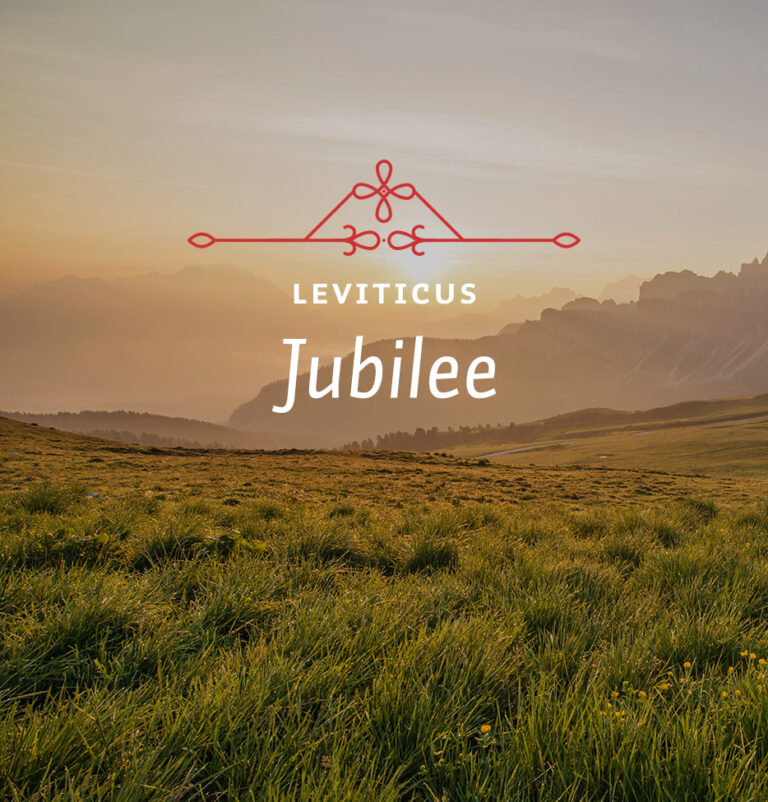
This is one of the most amazing pieces of legislation that you find in the Old Testament, at least to those people who have been taught that an unlimited and unhindered accumulation of wealth is the ultimate good. In the Year of Jubilee, all land holdings in Israel reverted to the original owners. This was one of the earliest—and perhaps the first—processes and laws for land reform in the history of the world, and certainly one of the most unique.

In this year the land was to revert to the original family owners. But if you look at the text carefully, that’s not the way the chapter itself talks about it. The text actually speaks not of the land returning to the people but of the people returning to the land. Now that must be important because it’s said five times over (see vv. 10, 13, 27, 28, and 41). The point seems to be that God is more concerned with the people than the land. We usually think the other way around. We are glad to manipulate people or get rid of people as long as we can accumulate our holdings. Now today, of course, it’s not generally land so much as it is bank accounts and stocks and so forth. But we manipulate people in order to have things. God says what’s important is the people, not the things.

There’s another important idea in this chapter, and it’s that of the kinsman-redeemer (see vv. 25-28). If a family was poor and was forced to sell their land, it wasn’t always necessary for them to wait till the Year of Jubilee came around to get it back. That could be a lifetime away. If that year came in your youth, you may be an old man before you got your land back. However, it was possible for the land to be bought back and restored to the original owner by a near relative who was called a kinsman-redeemer. Or, if the original owner prospered, he had the right to buy it back again. Now the amount the original owner had to pay was the difference between what the buyer had paid for it originally and the amount of crops that he had gotten out of it in the meantime. So if he had paid for ten years of crops and only three harvests had gone by, he had to be paid for the seven years of crops.

The long and concluding section of this chapter is verses 35 to 55, which has to do with duties to the poor. You might say, at first glance, “Why in the world are these duties to the poor here at all? Why does this belong in a chapter having to do with the Jubilee?” Well it shows that the central concern of the chapter is to protect or help the poor. There are a number of cases here.

Earlier in our study, I said that the Jubilee year began with the sounding of the trumpet. One day, according to the teaching of Paul, another trumpet is going to sound for us: “…and the dead in Christ will rise first. After that, we who are still alive and are left will be caught up with them in the clouds to meet the Lord in the air. And so we will be with the Lord forever” (1 Thess. 4:16b-17). Are you cherishing this hope? If you are waiting for the sounding of the trumpet, for the day when you will be caught up to be with Jesus Christ forever, then it will give you a right perspective on the things you possess now, and you’ll live for God in this world. Do you have that perspective? Does that really matter to you? If it doesn’t, the time to do it is now. Don’t wait. Life is short. It’s passing away. Make it count, and make it count right now.
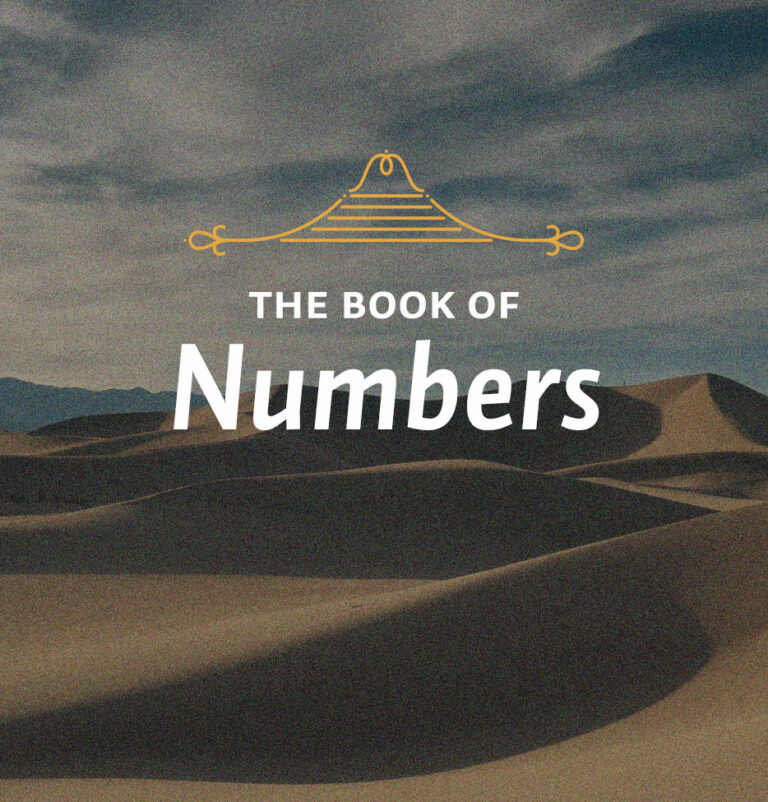
Let’s face it: Numbers isn’t the kind of book you just naturally pick up to while away a few hours on a weekend. It’s part of the Old Testament law, for one thing. That’s bad enough. None of us likes law very much. But in addition, it’s also called Numbers. Some who score very high on their achievement tests or who major in mathematics are interested in numbers. But the rest of us think they are generally pretty irrelevant. And this title isn’t an aberration either—it really is about numbers, at least the first section of the book is. It’s about the numbering of the tribes of the people of Israel, and the arrangement of their camp, and the purification of the people for their march. That’s just not terribly appealing. For the title of the sermon, someone had suggested that I call it “Numbers: An Audit,” since people do not find audits by the Internal Revenue Service appealing, either.

Notice that all of the fighting men were counted. Every one of them was important. That’s true today in the church as well. The Bible says in several places that God has a scroll in which our names are written (for example, Ps. 139:16; Rev. 20:12). Every one of us is important. Although we don’t have a census on earth in the church that corresponds with the very literal census of Israel, there is a heavenly census that is far more important.

Another thing to remember is that the number in the third chapter is compared to the total of the firstborn males in Israel. When the people were brought out of Egypt, God had killed the firstborn of all the Egyptians when the angel of death passed through the land. The firstborn of all the Israelites were spared who had put the blood upon the doorposts of their houses. God said that those firstborn children nevertheless belonged to Him. They were saved by the blood. If it wasn’t for the blood they would have died as well. They were sinners just like everybody else, and salvation was by the blood that pointed forward to Jesus Christ.

The Aaronic blessing is a very beautiful benediction, perhaps more so in Hebrew than it appears to be in English—although it’s beautiful in English as well. In Hebrew there are three lines, but broken down to six in our Bibles. Each one begins with the name of Yahweh, the LORD. And each line has two elements of benediction and they are arranged in a typical parallel fashion. The lines become progressively longer. In Hebrew the first line has three words, the second line has five words, and the third line has seven words. It’s as if the blessing of God is unfolding and pouring out upon the people.

When we get to the tenth chapter, the Israelites are ready to go. They had made trumpets that were to be sounded when they began their march. This section probably also belongs earlier chronologically. The trumpets may have been made when all of the other articles were made, as described especially in Exodus. But the description of the trumpets is held for here because the trumpets signaled the march.
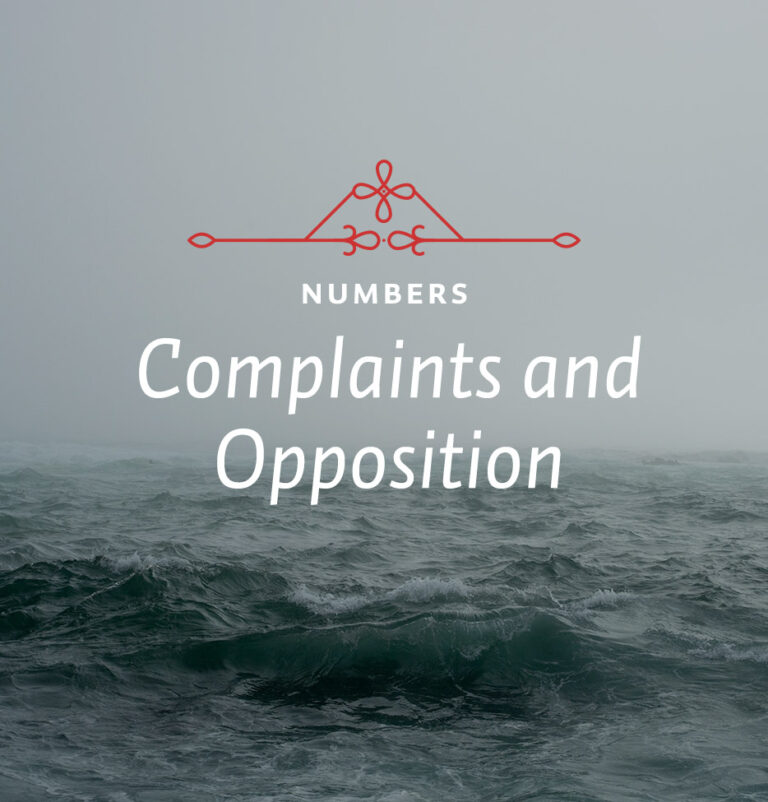
In the first ten chapters of Numbers, everything seems to be going well. The people are commended for obeying God, and the idea that they did what God commanded them occurs again and again. Yet when we come to the eleventh chapter, the tone is different and the people are complaining. This is a beginning of a series of complaints that’s going to go throughout the whole book.

What’s the difference between when they complained the first time about their diet and now? Well, the difference is that a year in their lives has transpired, and during that year God has revealed a great deal about Himself. When they came out of Egypt they didn’t know much about God at all. They were a nation of slaves. But He’d begun to teach them about Himself at Sinai. He taught them that He is a holy God, and that He is a powerful God. They’d seen the miracles. The Israelites knew how He was preserving them as they went through the desert by the manna they ate and the water they drank. A great cloud overshadowed the camp in order to protect them from the hot desert sun in the daytime, and then it turned into a pillar of fire at night to provide both warmth and light. They had perfectly adequate evidence of the power and the grace of God and shouldn’t have been complaining now.

Canadian Committee of The Bible Study Hour
PO Box 24087, RPO Josephine
North Bay, ON, P1B 0C7